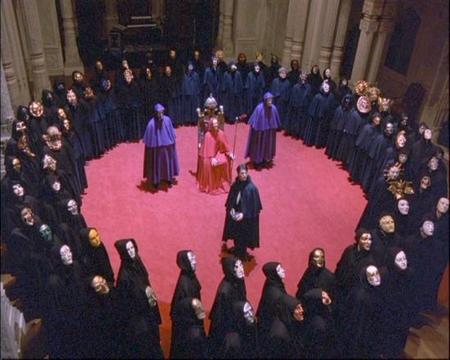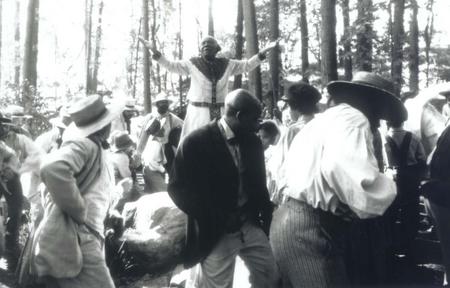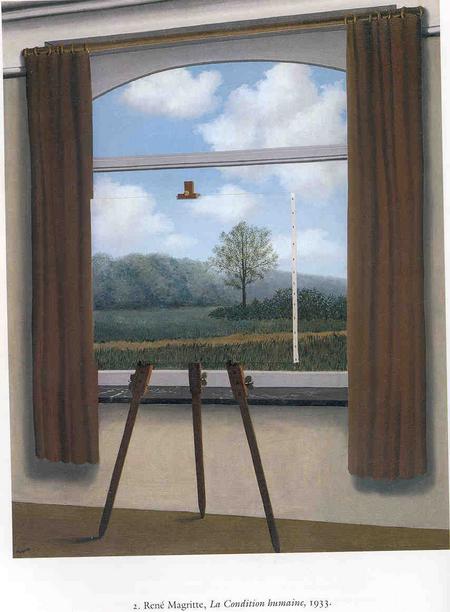September 29, 2004
WHY I AM SO FUCKED UP...
OK, most difficult post yet, but here goes....
I was sexually abused by a doctor when I was in my early twenties. It was just after I had been released from psychiatric hospital after my first nervous breakdown and put it into his care for clinical depression. To spare my own embarrassment, I won't go into the details of it, but suffice it to say, I was one of many young males that this doctor ab/used. Actually, his treatment of me was really quite trivial compared to what he did to others. His manipulations and his pretexts for filming the naked bodies of some of his victims in some cases involved telling young men that they were infertile when there was nothing wrong with them.
This same doctor had treated me for anxiety when I was 14 and had made it clear to me that my problems were due to one reason alone: sex. If I had got a girlfriend, all my difficulties would dissolve. :-)
In any case, he is now in jail. The case received a great deal of press attention. Last I heard, his tragic wife, convinced of his innocence, was campaigning to clear his name.
Now, don't be too ready to comfort yourselves, sexualists. Ah, that's why he is so anti-sex... because he was abused...'
Not at all. On the contrary, this episode helped me to see that it is not my aversion to sex that is 'sick', it is sex itself that is pathological.
Sex IS abuse. And if you think this is just one of my wacky theoretical reversals, at least pause to reflect on the fact that I have support from the most unexpected, most 'rational' source on this: Kant.
Kant believed that sex inevitably entailed treating the other person as a means to an end. Since this was contrary to one of his formulations of moral duty - the idea that we should treat people as an end in themselves, never as means to an end - he was in a quandary when it came to sex, which he rightly thought of as inherently pathological. The only way that he could get round this - he couldn't very well declare leave it at that, saying sex to be intrinsically wrong - was to evoke the marriage contract. Sex is only valid within marriage, Kant argued, because within marriage we have contracted out our organs for the use of the spouse, just as they have done the same for us, and so the categorical imperative can be suspended.
Kant's view is much closer to the truth IMHO than those who maintain that sex is 'healthy'.
I actually don't regard the abuse episode as that serious, except that it gave me an insight into the inherently abusive nature of both sex and authority.
No doubt middle class people will be nonplussed by my compliance with the doctor's wishes. Why did you go along with what he said? Well, they simply do not understand the degree of working class trust in and deference to bourgeois authority. It's difficult for us to believe that something a m/c professional is telling us is not true. We are naive enough to believe in the probity of their institutions.
Obviously this doctor ultimately did me a favour my removing such faith from me.
It's interesting that one of the original meaning of the word 'punk' was the male subjected to sodomy in jail. Iggy Pop was famously raped by bikers (cf 'Dirt' from Funhouse), but the most coldly pitiless observer of the sex/power abuse virus is undoubtedly Swans' Mike Gira, who was also raped whilst a young man. The Swans' releases 'Cop', 'Raping a Slave', 'Greed' and 'Holy Money' are hyper-cold diagrams of an economic-social humiliation machine:
'Keep your head on the ground. Push your ass up. Move around. Cry. Open your mouth. Here is your money. This feels good.' ('A Screw (Holy Money)'
'I give you money. You're superior. I don't exist. You control me. You're corrupt. You deform me. You own me.' ('Your Property')
The genius of Gira was to deny that there was anything extreme about these scenarios or descriptions. Rather than embittering or psychopathologizing him, his rape had politicized him, giving him a terrifying lucid insight into the idiotic evil of the male sex drive.
You've got me girl on the runaround
In the best possible way, I couldn't disagree more with John.
To say that Courtly Love is a version of the master-slave dialectic is getting it the wrong way round. Given that the Courtly Love machine emerged in the middle ages, it would be more accurate to say that Hegel's m-s dialectic is a garbled version of it. Historically speaking, there is no question that the modern notion of romantic love is a degraded version of Courtly Love. One of the most successful Courtly Love narratives was the roman de la rose (romance of the rose), and it is interesting that the word 'romance' originally meant "story of a hero's adventures," and "verse narrative," and only much later became solely associated with interiorised couple-passion. Courtly Love was entirely on the surface, about what Lacan calls ex-timacy, not the shared interiority of the modern domestic couple's 'four-eyed despotic machine.'
Besides, it's odd to invoke Bataille in opposition to Hegel. Much of Bataille's work was a reworking of Hegel's darkly pompous mystagoguery. But even that complicity with the Absolute Enemy is not the most troubling aspect of Bataille's (non) project. It is precisely his resolutely non-perverse, Catholic notion of perversion that is the problem.
Before I elaborate on that claim, a brief note on Catholicism. The problem with Catholicism is not excessive guilt. On the contrary, Catholics should be more guilty... for the Spanish Inquisition... for Bishop Landa burning most of Mayan culture in an afternoon... for systematically exploiting the poorest and most disenfranchised of the earth over two millennia and for encouraging them to breed indiscriminately (no-one mention Liberation Theology, please: that's only positive to the degree that it is Marxist, i.e. anti-Catholic)... for what Bergmann correctly identifies as its necessary, not accidental relationship to child abuse... 'Bergmann, ..., claimed that "the only rational view of the Roman Catholic Church" was that it was "a monstrous blasphemy of transcendent evil: incomparably more corrupt than the Mafia (if indeed it can be separated from organised crime, which of course it cannot)". His views, he said, were backed up by "hard sociological data which even they can't suppress now" concerning the – apparently endemic – problem of institutionalised child abuse amongst Catholic clergy. But Bergmann alienated any of the few supporters he had even within Protestantism by adding that "any religion that is serious about worshipping the Father-God will always be about child abuse; the only difference between the religion of the Paulites and that of the Abrahamites is that, in the Paulites' case, child torture spills over into child murder. Despite tying and binding Isaac, the Jewish God ultimately spares Abraham's son; but the Paulite God actually kills his own son."'
So, yes Catholics should be more guilty... not in that ooo, it is awful (so I'll do it) sense... but coldly guilty... so guilty in fact that they cease to be Catholics and really repent of their sins.

Bataille is as much a part of the despicable Catholic psychology of guilt and transgression as any other victims of this evil cult (you think I'm exaggerating? Tell me an institution that has done more evil on the planet? Nazism only lasted 10 years or so, whereas Catholicism is a still-existing, still-abusing two-thousand year reich). Everyone knows (but some continue to celebrate) that the deep sickness of Catholicism is that guilt ethically legitimates and pyschologically predisposes its victim-abusers towards destruction of others and self-destruction. Zizek has drawn our attention to Paul's observation that law produces (the desire for) transgression. The critique of this move is so well rehearsed that it scarcely seems worthwhile repeating it here. But suffice it to say that more or less the whole of Foucault and everything that is innovative about Lacan, Deleuze-Guattari and Burroughs is specifically designed to reduce that aren't we naughty transgresso-pantomimery to the interiorised, oedi-policed mummery that it is. And, needless to say, Spinoza could not have been less transgressive, less interested in urinating over the head of a priest to show how Bad he was. (Look at me, punish me... gaahhhhhhhhhh!)

'The whole Courtly Love/ Glamasochism thing stinks of a project with an infinitely deferred goal: "the act itself is unimportant/ boring". No. Far from it. Only in the climax-orientated, semen-drenched male libidinal economy which Bataille, far from escaping, produces yet another, academically titillating version of, is it is possible to defer goals. Nothing is deferred in Courtly Love, there is an almost unbearable plenitude, so that a breath, a sigh and a caress are enough to make your whole body shiver with intensely distributed libidinal charge. Nothing is deferred; what is positively avoided is anything that will terminate the plateau. Surely it's uncontoversial to note that the whole of, for instance, the Body without Organs plateau in ATP is about, not deferral, but a model of diffuse eroticism which can include sex and even orgasm, but which is not terminated by them. Deleuze-Guattari rightly take great pains to say that sex and even male emission phenomena need not end the plateau.
What then is this 'Act' of which the Sadeans (John and Glueboot) insist on maintaining the primacy? Only a Sadean sexualist (or a LLAD) could make a distinction between The Act and eroticism; for the Masochist, the distinction is meaningless; all gestures, all gameplay, is as fully erotic as any rutting. And that's because, though they will deny it, the Sadeans continue to have a model that is BOTH semiotically overcoded AND biologisitic. Semiotically overcoded because it privileges certain behaviours and activities as key signifiers ('we're having sex now, this is REALLY it, not foreplay....' and, conversely, 'it's over now, I feel disgusted, let's do it again....' There is no 'doing it again' for a Masochist (when did it stop?) Incidentally, when sexualists say 'they had sex five times last night' what is 'sex'?) Biologistic because, for all the mystificatory vagueness about what the Act involves, it is pretty clear that is sex understood in an absolutely straightforward way. And as I said before, the fact that this moves beyond genital copulation to orgasm doesn't mean anything. As Nina rightly says, there is nothing natural, but nevertheless there are biotic defaults, and there is nothing more biologistic than poking bits of yourself into holes or rubbing bits of yourself until they are sick. Look at dogs -- they'll fuck anything, any surface, any animal, any orifice will do. Are they 'perverse'? On the contrary, in their agitational drive to relieve tension by any means necessary one can see the whole Schopenhauerian torture chamber that is organic biotics absolutely exposed for what it is. Insofar as there is nature, insofar as there is biology, it is Sadean-Bataillean. I expect John and Siobhan will deny that this is what they mean by sex, but I suspect, and I could of course be wrong, that their defintion of sex is no more positive than the Trad Christian definition of the soul, i.e. it will proceed by negation, 'it's not x, it's not y': what is it then?
It it is precisely this drive to relieve tension - inevitably producing tristresse and therefore the need to relieve tension again and therefore etc... - that is what Masochism evades in its construction of a cold rationalist nu-earth hypersensuality. Unlike the pleasure principle drive to have done with tension, Masochism is literally in-tense, in that it takes its enjoyment from modulating tension.
So I would say that Jane Austen and Charlotte Bronte are much more erotic than the Bataille-feted Emily Bronte. Wuthering Heights' orgiastic excess (calm down, jeez, with this amount of hot blood you could end up like D H Lawrence, a fate worse than life) and Bad Idealized Bad Unattainable lover feeds straight into Mills and Boon and Sex and the City (this latter surely the final argument against sex retaining any subversive potential whatsoever: what could be more depressingly normalising?) And it's not only me that finds Bataille's porn novels, like Sade's, dis-spiritingly and unreadably tedious. At least Burroughs' Nova Trilogy, with its obsessive fixation on the Garden of Earthly Delights mechanical sex repetition, was about the way that sex was a boring treadmill.
Note also that Courtly Love does not involve 'worship of one partner by a robot'. It is the femachine Ladytron that is worshipped, at least in the first instance. But this is only the first phase of the game; there are infinite other cyberotic combinations possible.
Also, there is no need for glamasochism to share the disastrous focus on the Couple. In any case, the masochistic couple is already part of a cybernetic assemblage (indeed it is this extimate desiring-machine that makes possible their coupling in the first place). But what could be less perverse, more militantly normal, than the idea of 'the intimate couple against the world' that John invokes? As Zizek rightly points out, drawing upon Duras, the only positive model for the couple is not two people looking into one another's eyes, but both looking outwards to a Cause to which they have both pledged alliegance.

September 28, 2004
YOU TEND TO GET BURNED, YOU TEND TO GET BRUISED
I've been bitten so many times, but - I wear my heart on my sleeve, don't count the cost - so it's with caution, but real heartfelt gladness, that I say, welome back.
UNMASK! UNMASK!
The answer to John effay's typically stimulating response to my post on Courtly Love will have to wait until tomorrow, because I have spent all evening completing this post on Eyes Wide Shut over at Hyperstition. Of course, the post is, I hope, far from irrelevant to current discussions hereabouts.
September 26, 2004
THE MIRACLE OF LOVE, the answer of the real

In answer to those who think that Glamasochism makes impossible demands of women, I would recommend Zizek's wonderful 'Courtly Love, or Woman as Thing' from Metastases of Enjoyment. (Acquired for TWO QUID while out with Infinite Thought and Alberto yesterday --- only in Stoke Newington could you find Slavoj in a charity shop for £2!)
It is not that I or other advocates of Glamasochists have 'made up' the Idealization of Woman. Such Idealization is presupposed in any erotic love relation - which, as Lacan insists, can never be a relationship between persons, in part because only in the minds of Teenage Ontologists and Guardian Women's Page readers are there 'real persons'. What erotic love entails is the two roles of the capricious and cold Ladytron ('a machine which utters meaningless desires as random') and the servant-bondsman-Knight. These are roles, or rather, machinic functions, and as Zizek's example of The Crying Game, or my examples of Amanda Lear on the cover of Roxy's For Your Pleasure and Balzac's Sarrazine make clear, there is no question of biological essentialism here: men, women, heterosexual or homosexual, can play the function of either Lady or Knight. And play them they must if the game of love is to begin.
(A brief note here: yes, masochism is a perversion --- but, as Zizek rightly observes, it is the retrospectively understood truth of Middle Ages Courtly Love, from which all our notions of erotic - sometimes misleadingly called 'romantic' - love derive).
Paradoxically, in any case, the Ideal is the Real - the unattainable limit, the Deleuze-Guattari Body without Organs (and as Irigaray says in This Sex Which is Not One, women have always been Bodeis withour Organs). It is this Real which Lacan, following Freud, calls Das Ding, or the Thing. I love you for what is in you more than yourself. Again paradoxically, it is precisely when the Object attains subjectivity that when the game moves over a threshold into a desubjecifying machinic encounter and the "miracle of love" occurs.
'From a capricious and ironic sovereign Lady, she changes into the pathetic figure of a delicate, sensitive boy who is desperately in love. It is at this point that true love emerges, love as a metaphor in the Lacanian sense: we witness the sublime moment when eromenos (the loved one) changes into erastes (the loving one) by stretching out her hand and "returning love". This moment designates the "miracle" of love, the moment of the "answer of the Real"; as such, it perhaps enables us to grasp what Lacan has in mind when he insists that the subject itself has the status of an "answer of the Real". That is to say, up to this reverse, the loved one has the status of the object: he is loved on account of something that is "in him more than himself" and that he is unaware of - I can never answer the question 'what am I as an object for the other? What does the other see in me that causes his love?' We thus confront an assymetry, not only the assymetry between subject and object, but in a far more radical sense of a dischord between what the lover sees in the loved one and what the loved one knows himself to be.
Here we find the inescapable deadlock that defines the position of the loved one: the other sees something in and me and wants something from me, but I cannot give him what I do not possess - or, as Lacan puts it, there is no relationship between what the loved one possesses and what the loving one lacks. The only way for the loved one to escape this deadlock is to reach out his hand towards the loving one and "return the love" - that is, to exchange in a metaphorical gesture, his status as the loved one for the status of the loving one. This reversal designates the point of subjectivization: the object of love changes into a subject the moment it answers the call of love. And it is only by way of this reversal that a genuine love emerges: I am truly in love not when I as simply fascinated by the agalma in the other, but when I experience the other, the object of love, as frail and lost, as lacking "it", and my love none the less survives the loss.
We must be especially attentive here so that we do not miss the point of this reversal: although we now have two loving subjects instead of the initial duality of the loving one and the loved one, the asymmetry persists, since it was the object itself that, as it were, confessed to its lack by means of its subjectivization. Something deeply embarrassing and truly scandalous abides in the reversal by means of which the mysterious, fascinating, elusive object of love discloses its deadlock, and thus acquires the status of another subject.' (103-104)

The contemporary degraded and coarsely sexualized version of erotic love has renaturalized and biologized this miraculous moment as the time in which copulation happens. But in Courly Love proper, sex can be part of the initial phase of femachinic Master and attentive Servant. It need not be the semiotic trigger for the threshold shift into the miraculous encounter. No - the trigger is the moment when the Master shows the Servant 'mercy'. Let's be clear that this is not the end of the game, the shedding of masks and appearances to uncover the empirical subject beneath them, or worse, the prelude to reproducer-domesticated coupledom. Or at least it need not be. It can be the start of an even more challenging, even more complex and intense game, one that can last a lifetime at least.
September 22, 2004
Better red than dead
No apologies for sharing some more words of wisdom from Slavoj with y'all:
'What if we are "really alive" only and if we engage ourselves with an excessive intensity that puts us beyond "mere life"? What if, when we focus on mere survival, even if it is qualified as "having a good time", what we ultimately lose is life itself? What if the Palestinian suicide bomber on the point of blowing himself (and others) up is, in an emphatic sense, "more alive" than the American soldier engaged in war in front of a computer screen hundreds of miles away from the enemy, or a New York yuppie jogging along the Hudson river in order to keep his boyd in shape?
It is a properly Nietzschean paradox that the greatest loser in [the] apparent assertion of Life against all transcendent Causes is actual life itself. What makes life "worth living" is the very excess of life: the awareness that there is something to live for which we are ready to risk our life (we may call this excess "freedom", "honour", "dignity", "autonomy", etc.)
... The "postmetaphysical" survivalist stance of the Last Men ends up in an anemic spectacle of life dragging on as its own shadow. It is within this horizon that we should appreciate today's growing rejection of the death penalty: what we should be able to discern is the hidden "biopolitics" which sustain this rejection. Those who assert the "sacredness of life," defending it against the threat of transcendent powers which parasatize on it, end up in a "supervized world in which we'll live painlessly, safely - and tediously," a wolf in which, for the sake of its very official goal - a long, pleasurable life - all real pleausures are prohibited or strictly controlled (smoking, drugs, food...)
The Puppet and the Dwarf, 94-95
September 21, 2004
the very pinnacle of dimwitted bourgeois individualism
You're telling me/that we've been praying/ for a bright and clever hell
I think we've been brought to our knees/ but I can't tell...
Typically elegant response from Angus to the Vampire post.
Angus is surely right to identify that 'I'm very spiritual, I'm not into organized religion' move as 'the very pinnacle of dimwitted bourgeois individualism'.
There's a very serious point here. Capitalism, Marx reminds us, 'has drowned the most heavenly ecstasies of religious fervour, of chivalrous enthusiasm, of philistine sentimentalism, in the icy water of egotistical calculation.'
Bourgeois individualism and miserabilism are coterminous because there is no more terrible burden to bear than the weight of subjectivity. Subjectivism leaves people in a state of wretched confusion and desperation that is literally hell, the only hell there is. The thought that there is nothing more than conflicting monkey perspectives, all of which are equally 'valid', is a recipe for the kind of chronic depression that is endemic in the west now.
As Nietzsche feared, no-one could could rise to the terrible challenge of filling the space voided by the dead God, no human being could become the self-legislating ubermensch. Nietzsche's breakdown was the breakdown of the west, fastforwarded and compressed into one central nervous system.
But what was the fantasy of the ubermensch if not a grandstanding aesthetico-romantic glorification of bourgeois individualism?
When they say they don't believe in organized religion, their reservations aren't Deleuze-Guattari critiques of organisation :-), they are just saying that they want to continue to Carrie Bradshaw about in perpetual shilly-shalllying consumer equivocation, treating life as a buffet lunch to pick at.
What they want to preserve is the very thing that religion can liberate you from: ego. They don't have the discipline or commitment to subordinate themselves to the self-disassembly program.
DESIRING SEDUCTION

As a contribution to the sex discussion, I offer this, which after six years or so, stands up rather well, I think.
I'd be very interested in people's views...
September 20, 2004
September 19, 2004
The fundamental systemic violence of capital
Zizek brilliant on the Communist Manifesto:
'[T]he fundamental lesson of the "critique of political economy" elaborated by the mature Marx in the years after The Manifesto is that this reduction of all heavenly chimeras to the brutal economic reality generates a spectrality of its own. When Marx describes the mad self-enhancing circulation of capital, whose solipsistic path of self-fecundation reaches its apogee in today's meta-reflexive speculations on futures, it is far too simplistic to claim that the spectre of this self-engendering monster that pursues its path disregarding any human or environmental concern is an ideological abstraction, and that one should never forget that, behind this abstraction, there are real people and natural objects on whose productive capacities and resources the capital's circulation is based and on which it feeds like a gigantic parasite. The problem is that this "abstraction" is not only in our (financial speculator's) misperception of social reality, but that it is "real" in the precise sense of determining the structure of the very material social processes: the fate of whole strata of the population and sometimes of whole countries can be decided by the "solipsistic" speculative dance of Capital, which pursues its goal of profitability in a blessed indifference to how its movement will affect social reality. Therein resides the fundamental systemic violence of capitalism, much more uncanny than the direct pre-capitalist socio-ideological violence: this violence is no longer attributable to concrete individuals and their "evil" intentions, but is purely "objective", systemic, anonymous.'
SECONDHAND FANTASY
Karl Kraft draws my attention to the next in the appallingly-named but fascinating sounding Sweatshop series at the Serpentine Gallery.
Sadly, I'll be @ work, but I hope Karl will be able to provide a report for the kollektive.
Second-Hand Fantasy
Tuesday 28 September
3-5pm
The Sackler Centre of Arts Education at the Serpentine Gallery
Admission Free
Sweatshops are informal factories for ideas and debate. This series of discussions invites writers, artists, curators and theorists to explore current research interests.
During the Glenn Brown exhibition (14 September – 7 November), Lisa Le Feurve and Edgar Schmitz will be joined by invited speakers: Barry Curtis, Director of Graduate Research and Postgraduate Studies at Middlesex University; Kodwo Eshun, self-professed 'concept engineer' known for his theories on electronic music and its interface with art, technology and machine culture; Adrian Rifkin, Academic Chair of Visual Culture at Middlesex University; and artist, John Timberlake. The panel will explore ideas of science fiction, retro-futures and second-hand utopias.
For further information please contact
Louise Coysh, Project Organiser
Tel 020 7298 1533
Email louisec@serpentinegallery.org
September 18, 2004
WHITE VAMPIRES AND BLACK FUGITIVES

They say you can rap about anything except for Jesus
That means guns, sex, lies, videotapes
But if I talk about God my record won't get played - Kanye
Anger and humour are like the left and right arm. They complement each other. Anger empowers the poor to declare their uncompromising opposition to opression, and humor prevents them from being consumed by their fury. - James H Cone
What could better illustrate the Zizek's thesis that it is Christianity that is the ultimate taboo in the west now than the 'interview with a (real-life) vampire', Don Henrie, in Thursday's Metro?
Don Henrie apparently 'sleeps all day, has had this teeth filed and drinks human blood in closely guarded rituals'. He also features in Mad Mad House , 'a new reality show where guests have to live with Henrie, a witch, a naturalist, a voodoo priestess and a "modern primitive" who likes to hang himself from skin hooks.'
You can positively hear Zizek licking his lips when Henrie answered the question, 'When did you last suck the blood of a virgin?' thus:
'It doesn't work like that. We do it in tightly controlled circumstances, among ourselves as willing participants. We are all tested. When you look at other disciplines you have things like chi or life force energy. You have chakras that can be out of line. We believe similarly and that blood-drinking restores them. The blood is just a tangible and crude means of transferring energy.'
So, rather than being an unmanageable alterity, vampirism is now presented as a moral, even healthy, lifestyle choice. But the moral undperpinning for this cannot of course derive from the Christian western tradition, which is seen as - at best - a passe embarrassment. As Zizek argues, it is those favourites of the master class at leisure - 'zen bullshit' and New Aged out versions of other Eastern traditions - that are the only permissible sources for any moral justification in the 'enlightened' western core now ('enlightened' is these secumenical pick 'n' mix PoMo svelsters' self-deluding self-description of course; they are especially keen to differentiate themselves from the intolerance of Amerikan fundamentalist Protestantism).
'I don't believe in religion, but, like, there's some really gid stuff in zen ...' Zizek is surely correct that rather than being in any way disruptive of western capitalism, zen is the perfect lifestyle accessory for the consumer-worker-zombie.
'It is not only that Western Buddhism, this pop-cultural phenomenon preaching inner distance and indifference towards the frantic pace of market competition, is arguably the most efficient way for us to fully participate in capitalist dynamics while retaining the appearance of mental sanity - in short, the paradigmatic attitude of late capitalism. One should add that is no longer possible to oppose this Western Buddhism to its "authentic" Oriental version; the case of Japan provides the conclusive evidence. Not only do we have today, among top Japanese managers, a widespread 'corporate Zen' phenomenon: for the whole of the last 150 years, Japan's rapid industrialization and militarization, with its ethical discipline and sacrifice, have been sustained by the large majority of Zen thinkers - who, today, knows that D. T. Suzuki himself, the high guru of Zen in the America of the 1960s, supported in his youth, in 1930s Japan, the spirt of utter discipline and militaristic expansion?' (The Puppet and the Dwarf: the Perverse Core of Christianity, 26)
Now I have many problems with Zizek's defence of Christianity - which is in any case avowedly, and self-consciously the very definition of deliberate perversity - and I will take these up in a soon-come post on Zizek versus Bergmann. But Zizek is surely correct in implying that, far from being an opening of the west to the call of the Other, the appropriation of zen et al is the final breath of Orientalism. Or further: the Levinasian-Derridean ethics of Otherness is itself only a supremely refined version of Orientalism.
Instead of joining the dreary universal academic serenades to the Other and to hybrid identities (which only confirm the molar identities from which they are mixed) it is much more productive, much more subversive, to follow the lines of flight pursued by the renegade deviations 'within' 'our' culture. Speaking more precisely, such lines are not 'within' our - or any - culture at all. On the contrary, they are part of the Outside against the threat of which all sedentary social formations are organized.
It is important to be rigorously non-dialectical about this. The relationship between the interstellar fugitives and the Death Star Empire Attractor is not reciprocal; the imperial sedentary machines require the heartless acephalic jungle as the ulterior zone necessary for the production and continual reproduction of their identity. But since k-jungle seeks only to flee, it experiences Empire as a drag, an energy drain, whose only positive use might be the provision of resources which can be cargo-culted and pirated.

With all this in mind, it is worth opposing the apparently more radical Malcolm X with the supposedly conservative James Cone. For all his political acuity, X's conviction that Christianity was essentially a white man's religion left intact the alleged ethnic purity of the dominant Christian tradition.
Cone took the opposite stance. He argued that it was precisely the kind of Christianity practised by the African slaves after they were violently abducted and culturally annihilated in the services of building western Kapital (although, naturally, their mass extermination was only an accident, only a contingency; unlike Stalinism or Maoism, cuddly Capitalism didn't mean to kill anyone, so that's alright - ask Toneee, he's nice...) that was the essential form of Christianity. Paradoxically, though, such Christianity was without essence in the existentialist sense. It was what Kierkegaard called 'Christianity-in-becoming', a confrontation with ecstasy and dread, an absolute existential commitment, with nothing in common with the kind of smug, pompous Sunday certainty that he decried in the Hegelian Euroisie.
You can hear Cone's black theology of liberation in Baby Suggs' almost unbearably moving hymns to the black body in Toni Morrison's Beloved (Jonathan Demme's traumatic-exhilarating film of which must be one of the most under-rated films ever produced), in Missy Elliot, or in Kanye West, not only in 'Jesus Walks' but in his whole ecstatic-ethical aesthetic.
Baby Suggs' black nobility bears out what Zizek argues when he says that Nietzsche's attacks on 'slave morality', far from being aimed at the slaves themselves, were actually hyper-acute analyses of the decadence of the democratic master class, which arrogates to itself all the privileges of power but refuse to take any responsibility, accounting for its actions in terms of the 'will of the people', focus groups, etc. Deleuze-Guattari's claim in Anti-Oedipus that the bourgeois is the first slave of the ravenous machine of capital is thus strictly Nietzschean.
I can't resist leaving you with two more choice (carefully performed by our own in-house doctors) cuts from the Henrie interview.
'Blood can give people really bad stomach ache.'
And - best of all:
'Metro: Do you like your steaks rare?
Henrie: Yes, I do, but I saute them. The only type of blood I am interested in is sic) someone who has been tested and someone from my circle. I am still an omnivore - I often just like to slice up some zucchini and saute it with some sea salt and garlic.'
He should invite M Satai, Dylan Trigg and Anthony Hopkins round for a night's tasteful despair. Remember to bring the rioja though.
I'm sure they'd all be very nice to one another.
IMPORTANT NOTE:
In the spirit of Deng Xiaipengesque experimentalism, I am restoting comments for this post alone.
If bourgeois individualists insist on ruining discussion again, they will literally be wasting everyone's time, since their comments will be deleted and the drawbridge will be drawn up again.
It really is a simple matter.
Just ask yourself this: are you interested in contributing to the discussion, in discovering something, in following a desubjectified line, or do you want to just sound clever or air your own grievances? If the latter, please think twice and don't post a comment. Do it on your blog.
September 17, 2004
THOSE HOMES ARE TOMBS
Unhalfbricking with some sage words on the comments situation here... and a wonderful contribution to the domesticity discussion....
'The notion that your home should be a way to show off your taste, or your wealth, or your miraculous, laboratory-like cleanliness is anathema. Those homes are tombs, the modern equivalent of the burial chambers of the pharoahs where they lay surrounded by their wealth, their art, their mummified pets. It jolts me every time I return to the family home and realise that there are no longer any books there...well, no books in the living spaces of the house. All the books are concealed in the bedrooms upstairs, a few on shelves, almost as many in piles on the floors that are incongruous in a house otherwise devoid of clutter. It's nearly imposssible to relax there - the emptiness of the livingroom is oppressive, the cream carpet and the unstable sidetables a nerve-wracking combination.'
Yes, the emptiness of people's living rooms.... that strange, oppressive vacancy....
Heads will roll?
Heads will roll on the floor laughing more like.... :-)
(But, seriously, this all arises from Matt's - and Mark s is guilty of this too - conflation of Lemurian Time Sorcery with Fantasy bullshit.
As I said before, precisely the evil of Dean et al is that they have forever associated sorcery with airbrushed Fantasyscapes.
For Lemuria, think Marvel's pulp cosmology... Jack Kirby... Lovecraft... sonic fiction....Underground Resistance...
Not Rodney Matthews or bewhiskered wise old patriarhcs pointing into the mist, guiding their young charge on the quest towards the ancient city of Halfomdilllax wherein it is reputed lies the object of their mysterious quest...)
LOOK WHAT FEAR'S DONE TO MY BODY
The sidewalk papers gutterpress you down - Roxy
Sex is boring - Infinite Thought
You want to hurt and crave again - Magazine
 |  |
Whenever I imagine total humilitation, it always involves being psychically stripped in the tabloid Videodrome.
For those of us who've lived in the UK all our lives, the UK tabloid-videodrome-papula is a permanent presence in our heads, the worst thing in the world, the thing in Room 101... your own most embarrassing and pathetic moments (and we all have them, folks) replayed on endless loop, for the ephemeral delectation of the pruriently guffawing masses. (There but for the grace of God go they....)
Naturally, such a scene need only be virtual for it to exercise control; who knows what compromises, cautious restraint, quietism we unconsciously opt for out of fear of exposure in the Videodrome's humiliation-sensation-machine?
The recent belief-beggaring monstering of Wayne Rooney (he's a nineteen year old working class kid for fuxake, lay off him you fucking resentful pighead alcoholic Oxbridge scum*) once again demonstrates how integral a component sexuality is in the English Master Class's socio-psychic control apparatus.
Now, the Lawrentian 'healthy' sexualites would argue that this is a perversion of sexuality, a 'reduction' of sexuality to 'the dirty little secret' (cf Anti-Oedipus).
What if, though, sexuality is ESSENTIALLY a dirty little secret? This is what Zizek dares to suggest, in a passage which - in contradistinction to oday's lazy sex-pol orthodoxy - praises 'the Soviet pedagogy from the early 1920s onward' which argued 'that sexuality is inherently patho-logical, it contaminates cold, balanced logic with a particular pathos - sexuality is associated with bourgeois corruption, and in the Soviet Union of the 1920s there were numerous psycho-physiological "materialist" researchers trying to demonstrate that sexuality is a pathological state.'+

This is of to take the side of Orwell's O'Brien against his Winston Smith and Julia. Orwellian liberal orthodoxy has it that romantic-sexual passion is an eternal, 'natural' impulse, the projected re-engineering of which signals once and for all the evil inhumanism of Marxism.
But what if O'Brien is right? What if sexuality, particularly as expressed in us-against-the-world coupledom, is irredeemably decadent, precisely because it is 'natural', precisely because what we are dealing with here is one of the most stubbornly persistent and atavistic mammalian impulses? What if it is Smith and Julia, not the kommunist drones, who are the real slaves - slaves to passion - and O'Brien who is the Spinozist agent of freedom?
The inhumanism of the Soviet state came from its unequivocal dedication to the task of 'engineering human souls', its ruthless subordination of Nature to Culture, in the attempt (failed but nonetheless noble) to machine a proletarian revolutionary class out of resistant bio-socialized human material.
Almost no-one has taken seriously Foucault's rejection of sexuality (which has habitually, and grotesquely, been read inside the dominant sexualist paradigm). A consequence of Foucault's challenging of the idea that the truth of ourselves/ our selves is to be found in sexuality would be to view sexuality as basically trivial, no more defining of 'the reality of what we are' than are our defaecatory habits.
(Though with How Clean is Your Arse surely imminent, maybe I speak too soon... Foucault's point is, though, that there is that, presumably, any bio-cultural process could fill the function of privileged bio-signifying behaviour and neurotic attractor that sex serves for us ... You are what you eat ....)
What the sexually tormented New England Burroughs sought in the Nova Trilogy was not a release of his sexuality, but a release from sexuality. There's no better writer on the dreary-delirial treadmill of sexual desire, tristesse and renewed desire than Burroughs. He understood that (male) sexuality was essentially Sadean: i.e. an autononomic agitational reflex that ceaselessly and idiotically seeks release. The longuers in both Burroughs and Sade arise from the repetitive tedium of sexuality itself, its conservative slaving to the insatiable k- pleasure principle.
It is Sade who proved once and for all that nothing 'sexual' can be perverse, since all sexual behaviour is equally natural. Look at a dog fucking a chair leg. That is the reality of natural sexuality.
The profound and inherent perversity of glamasochism, by contrast, lies in its departure from sexuality in the direction of a wholly artificialized or synthetic eroticism. This is one of the things that the feminazi anti-glam Glums don't get about glam. The Glums, like Lads, associate glamour only with male sexual release, as if the only way of responding to the beautified female body is to emit seminal fluid, whereas the body of the model can be a pure surface devoid of any interiority which can be penetrated, either physically or psychically. Such a body can be explored with a gaze that is tactile-caressing rather than specular-phallic.
Here again, Foucault is an important guide: remember his distinction between a science of sexuality and an art of erotics. Sadie Plant's unfortunately-titled essay 'Coming Across the Future' is especially valuable in its insistence on Foucault's practical search for what he called the 'desexualization of pleasure'. The San Francisco bath-houses presented Foucault with physical encounters that were Spinozistic-machinic engagements with bodies, in no way organic or personal, 'You meet men there who are as you are to them: nothing but a body with which combinations and productions of pleasure are possible. You cease to be imprisoned in your own face, in your own past, in your own identity.'

While Foucault's anti-sexual program inevitably takes male-male encounters as its model, Irigaray's erotics in This Sex Which is Not One privilege female auto-affection. Much more than men, always tragically disabled by having the body with organ, women have the potential for a radically desexualized ecstasy, an unlocalized erotics in which the whole body is an erogenous zone ('women have sex organs more or less everywhere'). Tellingly, Foucault could only find this through drugs. Whereas (male) climax inevitably localizes pleasure, Foucault observed, 'things like yellow pills or cocaine allow you to explode and diffuse it throughout the body.' Perhaps it is only through drugs, dancing and music that we men can get a taste of what it is like not to be dominated by an aggressively localizing libidinal apparatus.
*(btw, donchathink that the class agenda of the tabloids was fully exposed when, at the same time as they were mercilessly white-trashing Rooney, they were mollycoddling whining state-subsidized middle-class crybaby loser Paula Radcliffe --- who, according to yesterday's Standard 'can now reveal' she was suffering from a 'leg injury' that she for some unstated reason 'had to keep secret'? - why can't fucking athletes ever admit that they lost because other people were faster than them?)
+ cf his remarks on 'today's deadlock on sexuality or art'. '[I]s there anything more dull, opportunistic, and sterile than to succumb to the superego injunction of incessantly inventing new artistic transgressions and provocations (the performance artist masturbating on stage, or masochistically cutting himself, the sculptor displaying decaying animal corpses or human excrement), or to the parallel injunction to engae in more and more "daring" forms of sexuality?'
September 16, 2004
Tally Ho!
I used to live in a hunting community in Somerset; they didn’t waste their time piddling about with foxes, but went after deer instead. They can’t use the straightforward ‘disposing of vermin’ argument about the deer (although they do a damned sight more damage economically than foxes), because they had wiped them all out on the Quantock Hills by the end of the nineteenth century. Consequently they had to reintroduce them in order to bring hunting back. Amusingly, the argument they use instead is ‘we control the deer numbers, but if we weren’t allowed to hunt them, the farmers (i.e. us) would wipe them all out to protect their crops’.
Like Mark, I’m not that bothered about the hunters’ prey when domestic animals are regularly packed into lorries to be shipped long distances and greeted at the other end by a walk into a building stinking of death, a bolt gun, a hook, and some rather sharp knives. What I despise about the hunting community is their belief that they have a God-given right to do what they please when out for a day’s jolly. Consequently, they tear up the countryside in 4x4’s and then park them wherever they fancy, blocking roads and driveways with gay abandon: Just try asking them to move, and see what happens. When they were meeting up the road from her, the only way my friend could pick up her kids from school was to park her car a quarter of a mile away from her own house in the morning and walk out to it in the afternoons. This was a bit of a bummer given her chronic arthritis. Also, these buffoons have the cheek to complain about dogs savaging sheep, when their packs of hounds race around the countryside under very little control, regularly disposing of domestic pets unfortunate enough to cross their path.
Still, you don’t want to imagine that banning hunting with dogs will do the foxes any favours: Last Summer some well-meaning dolts released seven urban foxes into the woods where I live, so that could have a happy life in the country. My next-door neighbour poisoned the lot of them.
WHO WANTS TO BE IN A HOVIS ADVERT ANY WAY?

Woebotnik asks me (via email): isn't it only the bourgeoisie who are opposed to foxhunting?
I'm not too worried about the foxes (although if they are allowed their bloodsports, why aren't we allowed ours? Can we have dog-fighting and bear-baiting back please?)
No. What I detest about the sanctimonous 'rural idiots' (Marx) is their self-righteous conviction that their 'way of life' is something we should all be interested in preserving.
What is this sacrosanct 'way of life'? Rigid class stratification left over from the middle ages... the rich man in his castle, the poor man at his gate .... faithful old Ted genuflecting to the Lord of the Manor... and of course no black faces to be seen anywhere....
The 'countryside' is no more economically viable than mining communities were. Not that mining communities, with their brutalised workerist masculinism, were any more worthy of preserving of course (you knew that the British Old Left was hopelessly reactionary when it became fixated upon ringfencing these archaims of early industrial capital, instead of agitating for better jobs and better quality of life for the people who lived in such communities).
(And as I've argued before, 'communities' are in any case essentially fascistic. John also usefully made the distinction between communities and collectives, which I think it is crucial to hold onto.)
But if the argument about subsidies and economic viability holds for miners, why doesn't it hold for rural communities and farmers? The sheer barefaced hauteur and arrogance of the hyper-aryan country twiterati coming into the multi-racial city and telling us 'we don't understand the difficulties they face' is utterly breathtaking when you bear in mind that the urban areas generate most of the wealth that is squandered on preserving the Medievalist Theme Park they insist in living in.
They don't have to live there, after all. They could get on their bikes and get a proper job, now couldn't they?
UPDATE: Otis Ferry
HARD LIFE IN COUNTRY
Don't even start me on that rural fascist scum....
How is it though that the Daily Mail can treat violent protest as 'a sign of legitimate anger in the country' when it is about protecting absurd ruralist rituals or about keeping the price of petrol down, but not for any other reason?
And how can they support the principle of subsidies for League-of-Gentlemen-Tubbs-like olde worlde yokelocalities, but reject them for mining communities?
Also note: Bryan Ferry's son, Otis, was amongst the protestors.
From coal miner's son to privileged rural twit in the space of a generation...
September 14, 2004
INTERIOR DECORATION - INTENSIVE DEATH
Incredibly, given the traumatic - but I hope tragicomically resolving - events detailed at Radio Free Narnia, Mark Sinker has managed to come up with typically provocative and stimulating responses to my post on the politics of domesticity:
'don't really buy yr v.momus-ish assault on interior-decoration obsession on TV: as usual it lacks dialectics, as usual the key detail is omitted of where the mass unconscious is allowing itself to explore its resistance to the K-KAPITAL-machine wotsname (= nowhere) (without you say where generalised resistance is possible, the KAPITALMACHINE is totalised = game over = capitulation)
the fact that the "insides" of our lives are now being put up to Public Gatekeeper Contest is the first sign of the (possible) rebirth of politics, not the final sign of the retreat from it (ie it coincides with the ultra-ballardian obsession w.plastic surgery)
(to jump back a wave, feng shui is abt the placation of the gods =
implicitly political; being on TV = it can be discussed in the world = it is being/can be made explictly political)
(k-rad conclusion: we shd begin applying punk feng shui to the reconstruction of our FACES) (haha that's the grace jones line here - will yr feminist critics buy this i wonder?) (actually i therefore think it shd be a punk feng shui of our INTERNAL ORGANS) (the overall collage of TV points us to this gracefully enough: it's only invisible if you let yrself accept the genre boundaries which turn TV from a portrait of the totality into a labyrinth) (an effective prescient dramatisation of this = that dr who series the WARGAMES i think)'
Actually, there is a link between that post and the post on the Glampunk discontinuum that I hadn't thought about prior to reading Mark's remarks: Hamilton's collage (and the world - the exteriorized interior/ interiorized external world - it opens up).
In the C4 documentary on Pop Art and Pop/Art I referred to earlier, Ballard was especially enthusiastic about the way that Hamilton's 'Just What Is It That Makes Today's Homes so Different, so Appealing' zeroed in on what, in a parody of McLuhan, you could call the 'global living room' of consumer Kapital. Hamilton's collage is absolutely inside this strange world that has no insides, which McLuhan's near contemporanous Mechanical Bride still feels it is possible to critique. It will be a few years later, in his essay on Burroughs, before McLuhan-O'Blivion, now homeopathically innoculated to the Videodrome signal his theory is helping to amplify, can describe the new mega-mediated world from within it. It is a world, he said, in which the central nervous system has been externalised; where there is 'no privacy and no private parts'.
Baudrillard's theory, especially round the period of The Ecstasy of Communication, also sets up unhome in this same bunker-pod living space, this media-monad, this representational vortex which is both the object and the subject of a process of total mediatization that will culminate in the end of the inside. Or (Jameson): the production of a Kapital(ist) space in which there is only inside.
Astonishingly, Hamilton knows all this, back in skiffle-ersatz Britain 1956.
Look at the recording devices --- or are they transmitters? And the man and woman, effaced, replaced, by their own mediatized ideals. No longer the protected inner space, oedipalized magic circle ---- nothing here but us recordings.
Or, better: nothing here but the feedback.
As for dialectics, naturally, I plead guilty to not being dialetical enough!
One of the very many problems with the Cult Studs uptake of Gramsci was the grotesque appropriation of the concept of hegemony. Rather than stressing the idea that the working classes were complicit in their own repression, the Cult Studs lobby seemed to suggest that hey we can't condemn hegemony too much, coz, like, it has partly been produced by the working class...
But the working class is not the proletariat.
Freedom cannot come through new, better representations, but by fleeing representation altogether.
Conceiving of your own living space as first and foremost a representation - for the big Other' gaze to inspect - that's (intensive) death.....
Any way, Mark, I'm sure that everyone else in the Kollektive will want to send their best wishes for you and yr mum --- and we hope to see you for another walk again soon ----
OUT OF THE HOTHOUSE
Naturally, like everybody else, I'm sorry to see Luke go.
I'm not capable of writing a heronbone tribute at the moment that exceeds this recent effort.
But that doesn't matter.
The best tribute a writer can have is the knowledge that he has changed others' percepts, affects and concepts (the three aspects of a body, according to Deleuze, glossing Spinoza). If the blogs in our network are anything to go by, it's evident that anyone who has sensitively engaged with Luke's work over the last twenty months or so has been changed, and changed for the better, by the contact with his writing. I hope such a change is evident in what I produce here, because it is certainly apparent in the way in which I engage with the world in a renewed way.
The thrill of challenging and being challenged by an attentive audience, the rages, the temporary consensuses, the bursts of enthusiasm and equally sudden lapses into melancholia that we have all undergone have meant that blogging in our little network has been a hothousing experience. The speed and intensity of the feedback network - something that could only happen on the net, could only happen NOW - has made possible a supercharged efflorescence of discourse and writerly personae.
But if you are a serious writer, like Luke is, you occasionally need time to withdraw, to collect and collate and synthesise.
His archives are dense enough, rich enough to keep even the hungriest heronbone devotee satiated for some considerable time yet.
So long as Luke is still writing, that's all I care about.
Time to get out of the hothouse, as Jerry Cornelius said in 1968.
But he'll be back, and better...
This time it really is D.o.A
I'm so glad that, after thinking long and hard about it, I decided not to buy tickets for Re~TG; Throbbing Gristle's 'one-off' reunion weekend at Camber Sands last May. Having cancelled the original event due to poor ticket sales, they said that they would curate an All Tomorrow’s Parties in the coming spring. In the meantime they attempted to placate the poor saps who had shelled out £130 each for tickets by inviting them to a 'free' recording session (read 'concert done on the cheap' with no proper lighting, etc.) in London. I didn't go, but my spies were distinctly underwhelmed by the whole thing. I think I'll pass on the forthcoming DVD.
Anyhow, it now turns out that the promised weekend event has been moved to December (should be lovely and warm in the chalets then) and will be curated by the Chapman Brothers, who were originally just going to be the interior decorators. What a bummer to be feted as electronic pioneers and the founders of the industrial genre and discover that, when it comes to putting on a musical event a couple of jobbing artists, whose idea of the extreme is scribbling on Goyas, are perceived as bigger crowd-pullers than you are.
So, something which was originally billed as a celebration of industrial music in the Twenty-First Century now has a line-up which looks like this. Goodbye Coil, Merzbow, and Thighpaulsandra and hello Mercury Rev, Violent Femmes and The Fall (who appear to have some sort of deal to play every ATP event there is). People I know with tickets are less than pleased. Still, at least Thee Majesty seem to have been taken off the bill.
There was some concern that the original Re~TG was going to blight their legacy; this little treat will flush it right down the toilet.
September 13, 2004
It's her factory
An alternative view.
Nina's flat is a hive of activity.
An inspiration.
Not a living room, still less a domestic display case, but a space in which impersonal production is always happening.
(Yr average domestic living room is of course a place of death.
Animal pelt everywhere....
and all the useless overpriced products of dead labour - look at what I converted all those hours of tedious effort into -
but most of all a dead zone of intensive stasis...
in which bodies are pathologized.... Take your shoes off... Don't sit there... Would you mind using a plate?
and implicitly: Actually I'd rather prefer it if you were dead... like the furniture...)
And no, Nina's flat is not a place that book binner should be allowed to do her worst in.... Books there have long since exceeded all available shelfspace, and now tower and teeter, leant up against walls, drawers, fireplaces.... Each one a gateway to the Outside...
As are the images - photographs, postcards, posters, reproductions of paintings - plastered, pasted, tacked on every surface....
And here are insekt kommunists, Nina and Alberto in their burrow, at least one always plugged into the k-space matrix, tapping away at laptop keyboards contiguously placed on a cramped table, Marxist Rationalist agents in an alternative 24.
The Politics of Domesticity
It's no accident that our current period of docilized political quietism corresponds with an obsessive and unprecedented cultural fixation on Interior decorating, domestic hygiene etc.
One of the most thrilling aspects of something like Fight Club was its outright and explicit rejection of this regime. To work was to service the Ikea-fantasy appt --- not the other way round. To get things happening entailed destroying the domestic space ---- the sheer strangeness of seeing a filthy house in a Hollywood film ----
A few remarks I made recently in the comments boxes which I repeat here, slightly edited, since they might have been missed:
'Potter's Nigel Barton.
What does Nigel's mum say when she hears the televised Nigel talking about feelings of shame and embarrasment and class? Potter is so acute - 'but the house is clean, it's spotless.'
Because cleanliness, hygiene is as much a marker of the working class as is cathode ray addiction. Is it really an accident that TV's content is increasingly merging these two impulses: watch TV/ be more neurotic about your domestic hygiene. Message behind both: STAY AT HOME.
'It's her factory...' The fact that there is an inducement to spend more and more time on domestic labour ... the image of my grandmother 'blacking the step'... course if you're into relativism, that's fine, hey you can't criticize, it was no less worthwhile than reading books and educating yourself. But if you find relativism dangerous, quietist, then, really, you feel the heartbreaking agony of lives that were lived below potential.'
The question should be how little time can I spend tending my domestic environment? (Just as the question should be how little work can I get away with doing in order to subsist?)
To reconfigure domestic spaces as bases of operations, not as display burrows fiercely protected from any kind of Outside....
FAO: OPINIONISTS, GLIBERALS, SUBJECTIVISTS
'So they maintained it as certain that the judgments of the gods far surpass man’s grasp. This alone, of course, would have caused the truth to be hidden from the human race to eternity, if mathematics, which is concerned not with ends, but only with the essences and properties of figures, had not shown men another standard of truth. […]
That is why we have such sayings as: ‘So many heads, so many attitudes’, ‘everyone finds his own judgment more than enough,’ and ‘there are as many differences of brains as of palates.’ These proverbs show sufficiently that men judge things according to the disposition of their brain, and imagine, rather than understand them. For if men had understood them, the things would at least convince them all, even if they did not attract them all, as the example of mathematics shows.'
Spinoza, appendix to Book 1 of the Ethics, (a passage cited approvingly by both Badiou and Althusser)
NO SHIT
Hot on the heels of a government survey which revealed that - prepare yourself for a shock - car mechanics overcharge for services they perform badly, Which? magazine today announced that most people do not trust estate agents.
Well, at least no public money was wasted on the second stunning revelation.
So here's the latest k-punk competition. Keep your eyes open... anyone who can spot a more fatuous and pointless survey than either of the above will receive a k-punk no-prize.
CHECK THESE
Philip is back, and on fantastic form.
My view of Lost in Translation is very similar to Philip's, I think. Its restraint, whilst in principle welcome given Hollywood's current sensory overload default, never really convinced. Coppola seemed like a director imitating the form of the art flick without being able to deliver the affect, with the result that, oddly, the film felt both underwhelming AND portentous.
However, Philip is right that Scarlett Johansson has a luminous prescence which is not reducible to her physical beauty. I approached the film expecting yet another boring rentababe, but Johansson has an expressive power lacking in the blank, interchangable mask that Hollywood habitually selects for.
Obv I disagree about sex, though. The less of that sort of thing, the better. :-)
Also on top form: Baal. Reached a new level, and the old level was y'know, pretty damn high.
RESONANCE DOCUMENTARY
News from Resonance FM:
'20th Sept: Magz airs her music blogumentary Where's Your Blog At with contributions from avid bloggers K Punk, Simon Reynolds, Woebot, Luka Heronbone and Geeta Dayal'
For those outside London, Resonance is also available on the internet. See k-punk sidebar.
I wasn't uh too well at that time, so don't expect too much from me....
September 11, 2004
K-PUNK, OR THE GLAMPUNK ART POP DISCONTINUUM
 |
\Gla"mour\, n. [Scot. glamour, glamer; cf. Icel. gl['a]meggdr one who is troubled with the glaucoma (?); or Icel. gl[=a]m-s?ni weakness of sight, glamour; gl[=a]mr name of the moon, also of a ghost + s?ni sight akin to E. see. Perh., however, a corruption of E. gramarye.] 1. A charm affecting the eye, making objects appear different from what they really are.
2. Witchcraft; magic; a spell. --Tennyson.
3. A kind of haze in the air, causing things to appear different from what they really are.
4. Any artificial interest in, or association with, an object, through which it appears delusively magnified or glorified.
Glamour gift, Glamour might, the gift or power of producing a glamour. The former is used figuratively, of the gift of fascination peculiar to women.
Masoch: 'Every woman has the instinct and the ability to make the most of her charms. It is an excellent thing to give oneself without love or pleasure: by keeping one's self-control, one reaps all the advantages of the situation.'
Wanda in Venus in Furs
Glam IS punk; historically and conceptually.
As Simon argued (what must be a year ago now), it was glam that made the break which allowed punk to happen.
Essentially, glam returned pop to the working class audience disgusted and turned by the hippies' lazy sleaze.
For all its 'androgynous' imagery, hippie was fundamentally a middle class male phenonomenon. It was about males being allowed to regress to that state of His Majesty the Ego hedonic infantilism, with women on hand to service all their needs. (If you don't believe me - and I'll level with you I'm very far from being an objective commentator on hippie lol, read Atwood's Cold Rationalist classic, Surfacing to see how 'liberating' this was for the women who lived through it).
'Thus even Zarathustra/ another time loser/ could believe in you....'
Seventies glam played the Nietzsche of Beyond Good and Evil and The Genealogy of Morals (the Nietzsche who celebrated aristocracy, nobility and mastery) against the young Dionysian Nietzsche. As Simon argued:
'Glam's tendency (through its shifting of emphasis toward the visual rather than sonic, spectacle rather than the swarm-logic of noise and crowds) towards the Classical as opposed to Romantic. Glam as anti-Dionysian. The Dionysian being essentially democratic, vulgar, levelling, abolishing rank; about creating crowds, turbulence, a rude commotion, a rowdy communion. Glam being about monumentalism, turning yourself into a statue, a stone idol.'
But glam rectified the genetic fallacy that haunted Nietzsche's thinking. While there's no doubt that Nietzsche's analysis of the deadening effects of slave-moralising 'egalitarian' levelling in Beyond Good and Evil and The Genealogy of Morals identified the sick mind virus that had western culture locked into life-hating disintensification-unto-death, his paeans to slave-owning aristocratic culture made the mistake of thinking that nobility could be guaranteed by social background.
Nobility is precisely a question of values; i.e. an ethical stance, that is to say, a way of behaving. As such, it is available to anyone with the will and desire to acquire it - even, presumably, the bourgeoisie, although their whole socialization teaches them to resist and loathe it. More than anyone, Nietzsche understood that, the European bourgeoisie's deep hostility to 'the notion of superiority' concealed a viciously resentful psychopathology.
If Nietzschean atheology says: we must become god, bourgeois secularism says: No-one may be greater than me - not even God.
Everyone knows that there has always been a deep affinity between the working class and the aristocracy. Fundamentally aspirational, working class culture is foreign to the levelling impulse of bourgeois culture --- and of course this can be politically ambivalent, since if aspiration is about the pursuit of status and authority, it will confirm and vindicate the bourgeois world. It is only if the desire to escape inspires taking a line of flight towards the proletarian collective body and Nu-earth that it is politically positive.
Glam was a return to the Mod moment(um) that had been curtailed by the hippie hedonic longeur of the late 60s. Like most names for subcultural groups, the term 'Mod' started off life as an insult, in this case hailing from the mods' perpetual adversaries, the rockers. As Jeff Nuttall explains, to the rockers, "'Mod' meant effeminate, stuck-up, emulating the middle classes, apsiring to a competitive sophistication, snobbish, phony.' (Bomb Culture, 33)
But no dilettante/ or filigree fancy/ beats the plastic you
Mods in the sixties were very different from how they appear in the designer cappuccino froth of 80's soul-cialist retro-mythologization. It was the rockers who appealed to the 'authentic' and the 'natural': their rebellion posed as a Rousseauistic resistance to civilization and mass (produced) culture. The mods, on the other hand, embraced the hyper-artificial: for them, Nuttall wrote, 'alienation had become something of a deliberate stance'. Nobility was not innate for mods: rather, it was something to be attained, through a ruthless de-naturalization of the body via decoration and chemical alteration.

The mods were in every sense hooked on speed, and the black American music they gulped down with their bennies and coffees was consumed in the same spirit and for the same reasons: as an accelerator, an intensifier, an artificial source of ecstasy. That is, as a chemical rush into Now, NOT as some timeless expression of Pride and Dignity.
In the desire (my official position on this now btw is that 'libido' should be used in place of 'desire')-pleasure relation, there is a third, occluded term: sensuality.
The hippies' sloppy, ill-fitting clothes, unkempt appearance and Fuzzed-out psychedelic fascist drug talk displayed a disdain for sensuality characteristic of the western master class (hey man, it's all about the MIND).
When hippies rose from their supine hedono-haze to assume power (a very short step), they brought their contempt for sensuality with them. Brute functional utilitarianism plus aesthetic sloppiness and an imperturbable sense of their own rights are the hallmarks of the bourgeois sensibility (look at all those shops in Stoke Newington that say they'll open 'tennish' and you know exactly what class you're dealing with).
The hippie power class wanted power without having to go to the effort of power dressing. Naturally, middle class hippie 'feminists' never missed a stride in their move from alleged egalitarianism to supercilious judgementalism. What is the disdain for cosmetics and clothes if not an attack on the working class? The assumption of bourgeois so-called feminists is that their lives of neurotic bed-hopping 'freedom' and Carrie Bradshawing perpetual adolescent equivocation are better than the working class pattern of (once) getting married young and (now) having children young, when it is clear that it is just another trap - and not necessarily a more congenial one.
Now the bourgeois philistines have destroyed glam and returned us to their preferred aesthetic mode: Romanticism. The contemporary bourgeois Romantic has realised Romanticism in its most distilled form yet. While the so-called Romantic poets, musicians and painters of the late eighteenth and early nineteenth century remained sensualists, whereas our contemporary Romantics are defined by their view that sensuality is at best an irrelevance, a distraction from the important business of the expression of subjectivity.
Romanticism is the dressing-up of Teenage Ontology as an aesthetic cosmology. Teenage Ontology is governed by the conviction that what really matters is interiority: how you feel inside, and what your experiences and opinions are. In this sense, sloppy drunkard Ladette Tracy Emin is one of the most Romantic artists ever. Like Lads - the real inheritors of the hippie legacy - Emin's bleary, blurry, beery, leery, lairy anti-sensualist sensibility is an advert for the vacuity of her own preferences.
What we find in Emin, Hirst, Whiteread and whoever the idiot was who rebuilt his dad's house in the Tate is a disdain for the artificial, for art as such, in a desperately naif bid to (re)present that pre-Warholian, pre-Duchampian, pre-Kantian unadorned Real. Like our whole won't-get-fooled-again PoRoMo culture, what they fear above all is being glamoured. Remember that glamour means, 'Any artificial interest in, or association with, an object, through which it appears delusively magnified or glorified.'
But let's make our case by considering some artifacts in some detail.
Exhibit one: the cover of Roxy Music's For Your Pleasure, 1973
The image is a mistresspiece of ambivalence.
Let’s approach it through the eyes of Ian Penman, the most consummate of Roxy observers. (No doubt, Penman, like me, is endlessly drawn back to Ferry because he took the same journey from the working class into acceptance into the English master class).
(I make no apologies for citing Penman’s text, ‘The Shattered Glass: Notes on Bryan Ferry’ at some length, since it is almost criminal that this bravura display of theoretical elegance should be mouldering amidst the pages of a long-forgotten, chalk dusty Cult Studs collection*).
‘On the shoreline of For Your Pleasure, beneath it, on the waterfront strand, stands the second of many new models: at first sight the second installation of the stock Ferry/ Roxy woman.’
But to get the full picture we have to fold out the sleeve, so that we can see Ferry looking on...

Penman goes on:
‘Ferry fills out his function as her chauffeur (landlocked ferryman: a sign of the times). He waits in amused admiration, surveying the neatness of the visual pun - the model takes her cat (for a) walk: forming a uni-form and uniformly predatory alliance with her black panther, eyes and mouth directed out at the viewer. Imperiously, she takes the air, she fields his grace, takes her anima for a prowl and a stretch. Ferry - for sure - remains to be seen, smiling manfully behind her back, artfully protected by the fold in his sleeve. He had arranged his own look as both within and outside of the main frame.’
(’Within and outside of the main frame: is that so often where we find ourselves, lost, stranded, these days ---?)
Cut.
‘She is a model woman, to be sure; fashion pushing into abstraction and rarified codification, not there for the benefit of a product as such or altogether in the name of Art; so she appears to be what? She appears, on the condition that she appear to be without attributes. We can attrribute nothing to her beyond a certain imaginary realm of wealth, of wealth as fetish, (Helmut) Newton’s law of physiques. She is sheerest sharp blue nothingness. (For the cool-and-blue post-Duchamp artist, it seems entirely for beauty to take the veiled form of scissors.’
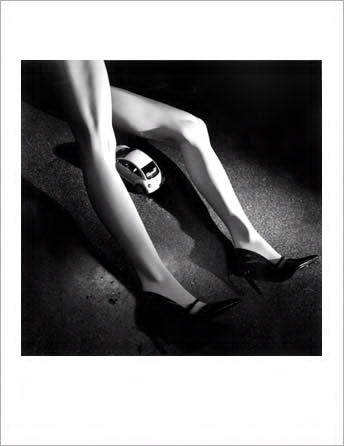
As an aside, since this concerns another debate: the last things Ferry’s songs were - at this stage at least - were ‘just good tunes’. The first thing they were, were questions: including questions about what a good tune might mean...
And - at this stage- Ferry's songs were no more 'love songs' than Magritte's Human Condition was a representation of a landscape. Like Magritte, Ferry's sheer coldness and distantiation cannot but draw our attention to the framing machines that make possible the emotions of which he sings.
Another cut, to a 'realm of a certain narcissistic eroticism he is not allowed entrance to without putting his heterosexual sensibility in doubt.’
‘All his Songs’ women (and this will be especially so with ‘Stranded’ and subsequent plaints) are voiceless sirens who - although wielding the utmost power over the artist’s life and sensibility - seem to be without implication (which is to say: eternalised out of existence). Neutered time and place (those perennial spans of Fashion) coalesce naturally into the figure of the woman. Woman as figure, or scene - war pin up, cat-woman, amazon, siren, Riefehstahl Maedchen.’
[W]ielding the utmost power over the artist’s life and sensibility...’ The utmost power.... Is he, the artist, Severin, the protagonist of Masoch's Venus in Furs? Or Sarasine, the hapless hero-dupe of Balzac's novel who unwittingly falls in love with a castrato?

Amanda Lear with Dali
Because, you see, the ironic punchline was: she is not(-all) a woman.
Amanda Lear, the For Your Pleasure model was a transsexual (though, in yet another complication, she later denied it). A transsexual, moreover, whose operation might have been paid for by none other than Salvador Dali.
Either way, it is clear that Ferry has set the tone for a 1970s in which the male is both glamorous and glamoured, himself a gorgeously-styled photogenic object, entranced and seduced by a cosmetic beauty he partly wants to make contact with, but mostly wants to cold pastoralise into an immutable untouchability. 'Mother of Pearl' - which as Penman observed on Pillbox, is the whole of Lacan in seven minutes, more or less - is the closest Ferry comes to writing a manifesto for his meta-melancholia, a meta-love song about the impossibility - and undesirability - of attaining the Ideal object.
Now this melancholia is not straightforwardly 'tragic' (and even if it were, it would have little to do with any bourgeois sensibility, since, as everyone from Shakespeare to George Steiner [The Death of Tragedy] to Nietzsche to Bataille demonstrate, bourgeois secularism is inherently inimical to any notion of the tragic).
But Ferry's sensibility is definitely Masochistic. (As opposed to that of the Sixties, which, as Nuttall, for one, suggests, was Sadean. Compare the Sixties-sired Lennon's 'Jealous Guy' - the Sadist apologizes - to Ferry's reading of the song - the masochist sumptuously enjoying his own pain - for a snapshot of a contrast between the two sensibilities.)
The Masochist's perversity consists in the refusal of an exclusive or even primary focus on genitality or sexuality even in its Sadean polymorphous sense, which is perverse only in a very degraded sense.
The Sadean imagination quickly reaches its limits when confronted with the limited number of orifices the organism has available for penetration. But the Masochist - and Newton is in this respect, as in so many others, a Masochist through and through, as is Ballard - distributes libido across the whole scene. The erotic is to be located in all the components of the machine, whether liveware - the soft pressure of flesh - or dead animal pelt - the fur coat - or technical. Masochism is cyberotics, precisely because it recognizes no distinction between the animate and inanimate. After all, when you run your fingers through your beloved's hair, you are caressing something dead.
How had Ferry got here, become stranded in the early seventies, an artist-voyeur art-director Masochist?
Richard Hamilton, 'Just What Is It That Makes Today's Homes so Different, so Appealing' (1956)
Ferry famously studied painting under Richard Hamilton, the so-called godfather of British Pop Art, at Newcastle University. Can we even begin to reconstruct the impact that Hamilton's art had on British culture?
Well, you can get some impression of it from the fact that, in a documentary on Hamilton made by C4 in the early 1990s, Ballard cited Hamilton's 1956 'Just What Is It That Makes Today's Homes so Different, so Appealling' as one of the cultural events that made it possible for him to be a science-fiction writer. It would be better to say that Hamilton made possible Ballard's exceeding of science fiction, his discovery of k-punk.
'56 was, of course, the year of Presley's breakthrough records. In its own way, though, Hamilton's collage was at least as important as Presley in the development of British Pop. (You see Siobhan, everything starts in Newcastle!)
After the 50s, Pop and Art have always been reversible and reciprocally implicating in British culture in the way that they are not in America. Nuttall: 'The students and the mods cross-fertilized... Purple hearts appeared in strange profusion. Bell-bottoms blossomed into wild colours. Shoes were painted with Woolworths lacquer. Both sexes wore make-up and dyed their hair... The air in the streets was tingling with a new delirium.' (34)
British pop's irreducible artificiality makes it resistant to the Romanticist naturalization that the likes of Greil Marcus and Lester Bangs achieved in respect of American rock. There is no way of grounding British Art Pop in a landscape.
Not a natural landscape in any case.
If Art Pop had a landscape it would be the agressively anti-naturalistic one Ferry collaged together on 'Virginia Plain' (named after one of his paintings, which was itself named after a brand of tobacco). Is this an internal landscape, what the mind's eye sees? Perhaps. But only if we recognize that - as Hamilton's collage and Ballard's fiction insist - in the late twentieth century the 'space' of the internal-psychological was completely penetrated by what Ballard calls the media landscape.
When the British pop star sings, it is not 'the land' which speaks (and what does Marcus hear in the American rock he mythologizes in Mystery Train if not the American land?) but the deterritority of Amerikan-originated Consumer culture. Hence the braying grotesquerie of Ferry's singing voice on those early Roxy releases. (And the different grotesquerie of today's simoting pop idols.)
With the firsthand expertise of someone who has had to lose his voice in order to speak (for that is what you must do if you educate yourself - or are educated - out of a working class background ), Penman brings out very well how integral the problem of accent - of losing a Geordie accent, of not gaining an American accent - was to Ferry's career.
As a student, Ferry's life was divided between his daytime movement through the art milieu and night time fronting of a soul band doing covers. Two voices, two lives. 'I hadn't found anything to incorporate all of me.'
The early Roxy records are Ferry's Warhol-Frankensteinian attempts - the joins still showing, thrillingly, horrifyingly - to hand-machine a space that would incorporate his day and his night self. So they are not so much expressions of a coherent subjectivity as a kind of destratification-in-progress, the production, on the fly, of a Pop Art plane of consistency which he could feel at unhome in.
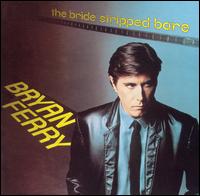
So here was a Pop music, astonishingly, more shaped by Duchamp than Bo Diddley. The methodology Ferry deployed on his solo albums of cover versions (and remember that such albums were almost unknown in rock music at the time) was explicitly Duchampian. His renditions of standards such as 'Smoke Gets in Your Eyes' and 'These Foolish Things' were, he said, Duchampian 'readymades': found objects upon which he put his own stamp.
Duchamp's Large Glass (aka The Bride Stripped Bare by her Bachelors, Even): the version in Tate Modern was reconstructed by Richard Hamilton
Part of what made the early Roxy sound so cold - particularly by comparison with the hot authenticity of American rock - was the fact that they were evidently not an aggregation of pontaneous, creative subjects, but a meticulously executed Duchamp-type Concept: a group whose every gesture was micro-designed, and who credited their sylist, fashion designer Anthony Price, on their album sleeves.

Bryan Ferry on the Old Grey Whistle Test in 1973, in black contact lenses and Anthony Price suit
The great temptation for Ferry would always be to slip inside the frame: to become, really, the heartaching bachelor in the dreamhome, to achieve what Simon calls the 'fantasy of stepping outside the lowly world of production into a sovereign realm of pure unfettered expression and sensuous indulgence, an imaginary and fictitious notion of aristocracy (more Huysmans than real lords who have to do humdrum things like manage their estates, juggle their investments, do a bit of arms dealing).' To achieve the total simulation of manners that he was up till then only pastiching-affecting.
And, isn't Simon right, aren't Ferry's later records all about 'the disillusionment of actually achieving the supermonied aristo life--Ferry, condemned to mooch jaded forever through art openings, fashion shows, all tomorrow’s parties (that old tis better to journey than arrive line)'?
Let's leave Ferry there, stranded, framed.
And cut.

To 1982. Compass Point, Nassau.
Grace Jones' astonishing recording of Joy Division's 'She's Lost Control'.
Masoch: 'A slap in the face is more effective than ten lectures, especially if it is delivered by the hand of a lady.'
Kodwo Eshun: 'The womanmachine Grace Jones' 82 remodel of Joy Division's 79 She's Lost Control updates the '50s mechanical bride. For the latter losing control meant electric epilepsy, voice drained dry by feedback. For Jones, the female model that's losing control induces the sense of automation running down, the human seizing up into a machine rictus. The model - as girl, as car, as synthesizer - incarnates the assembly time of generations, obsolescence, 3-year lifespans.
The model is the blueprint for the post-Cold War cyborg, the womanmachine modified and mutated by the military medical entertainment complex. Hence Kraftwerk's The Model, where the bachelormachines are threatened by the womanmachine's superior reproductive capability. The Model is an excerpt from the post-war machine-reproduction wars.' (095)
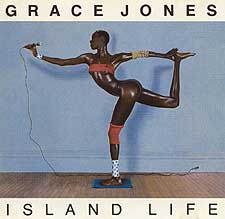
Jones is the sublime object before which Ferry prostrated himself -- and who talked back. Through vagina-dentatal teeth.
Be careful of the womanimal-machine. It bites.
Jones is not a cyborg because she is not an organism of any kind (and the modifier 'cybernetic' is in any case redundant, since all organisms, like everything that works, are cybernetic).
She is a neurobotic femachine.
The mechanical bride stripping her bachelors bare.
Jones was herself once a model, but when she has the opportunity to 'express herself', she ruthlessly exploits her own body and image much more than any (male) photographer would have dared to. 'In a recent poll by Men's Health magazine, the male readership named Grace Jones ... among the women who scared them the most.' (Brian Chin).
The game becomes the hunter.
She out-Duchamps Ferry, (dis)covering his 'Love is the Drug' as a found object to be absorbed by the femachine.
Jones understands her body Spinozistically as a machine capable of being affected and producing affects. This body is in no way limited to the organism; it is distributed across photographs, sound and video - and none of these media constitute a representation of an originary organic body. They are, each of them, unique expressive components of the Jones singularity.
It's total immanence.
There is no Grace Jones the subject who expresses her subjectivity in sound and image. There is only Jones the abstract hyperbody, the cut-up scissormachine that cuts itself up, relentlessly.

The Jones body is immanent, too, in that, as Kodwo repeatedly insists of sonic fiction throughout More Brilliant than the Sun, it produces its own theory.
Certainly, by the time that Haraway's 'Cyborg Manifesto' limps onto the scene, it is only to mislead via reterritorialization.

The cover of The Anvil: Steve Strange photographed by Helmut Newton
Cut again.
To London, 1982.
(Reproduced from the early days of blogger k-punk.)
The sex appeal of the inorganic.
Paul Tickell's review of The Anvil,
NME 27 Mar 82 (whole review reproduced on the excellent Magazine site):
'I'd thought 'Contort Yourself' the right kind of music for Newton's sado-eroticism - but 'The Anvil' is a greater approximation. You wanted -the moderne dance - well ... here it is: the night-time moves of marionettes - dummies - puppets - clowns - and imaginary celluloid beings. -it's all a little deathly - the sound of commodities fucking - but a noise which can be a good deal more exhilarating ("the sex appeal of the inorganic" - Walter Benjamin) than healthy fun-loving creatures going at it.
All in all - Visage are a rather seductive disease - the skull beneath the made-up skin.'
More material from early k-punk:
'Roxy versus Visage: a shift from subject to Object (therefore, following Baudrillard's logic in Seduction, from masculine to feminine). Fem-glam notwithstanding, Ferry retained for himself the male role of the one-who-looks . The problem , for Ferry, is the (male) gaze - how much to look? For how long? 'Then I look away/ too much for one day.' Strange, meanwhile, is invariably the looked-at . He is the discarded plaything in 'Mind of a Toy' (telling title, that), the object of gossip in The Anvil's maudlin 'Look What They've Done' and 'Whispers.' The model, here, is, --- the model: the anxiety - how am I seen ?
Can we assume, btw, that Gibson derived the name Neuromancer from 'New Romantic'? If so, Gibson's transposition suggests a much more interesting, and appropriate, name for the nerve sorcery of these newly-wired electronauts. 'Romantic' always struck me as way-off beam for a culture so fastidiously uninterested in depth/ emotions/ truth.)
The case against Visage always seemed to me to depend on rockist prejudice: they didn't play live, they were a vehicle for a clothes horse who 'couldn't sing', they represented the return of prog. Isn't there also a masculinist agenda, too, in the implict rejection of the 'superficiality' of fashion and clubbing?
Visage thoroughly stripped their sound of the trappings of r and r, ostentatiously parading an Un-American ancestry. Thematically and sonically, Visage evoked a decadent Europe of seductive urban alienation (cf the Mondrian-like vision of endless high rises in Blocks on Blocks) and sumptuous glamour (cf the name, and the track, 'Visage'; the French vox on 'Fade to Grey'), conjured through vocoder vox, synthesizers and Billy Currie's pseudo-classical flourishes. American influences came rerouted/ refracted through Europe: Moroder disco; Morricone (cf McGeoch's 'Once Upon a Time in the West'-isms on the Spaghetti western/ Clint tribute 'Malpaso Man' off 'Visage'). Cinema was a major node: much of Visage's sound belongs to what would later be called 'virtual soundtracks' (Barry Adamson, one of the architects of this genre, was of course a Visage member). The mood was one of dis-affection, not the robotic functionality of Kraftwerk, nor the schizo-dislocation of Foxx/ Numan, but the Euro-aesthete's 'exhaustion from life', nowhere better expressed than on the Interview with the Vampire-like 'Damned Don't Cry.' Visage didn't thematize machines in the way that Kraftwerk, Numan and Ultravox did: like Yello, they seemed to operate in a future-past glittering hall-of-mirrors in which synthesizers and electronics were less a new innovation than a taken-for-granted mainstay.
Visage's 'cyberpunk baroque' is a link between Roxy Music, Vangelis, disco and what would later become dance culture. Anyone who doubts this should check out the dance mixes of Frequency 7 or Pleasure Boys: the instrumental breakdown in the Pleasure Boys remix is pure acid house, and Frequency 7 is nothing but a breakdown, a thrillingly anachronistic slice of machine-techno. It was no doubt Strange and Egan's role in the Blitz/ Camden Palace that facilitated the move into dance. Making clubbing and dancing, rather than the gig, central was a crucial step (for Visage specifically, but for the New Romantic scene in general). Strange was less important as 'frontman' than as pure image, his very diffidence and passivity as a vocalist anticipating dance's later complete effacement of the singer.'

Except the singer doesn't get completely effaced by dance.
It returns as the femachine Roisin.
Cut to Now.
I've little to add to my recent remarks on Moloko and Roisin Murphy as the latest - but I hope not last - contribution to the Art Pop story.
But it's worth distinguishing Murphy from two artists John recently mentioned in the comments boxes: Madonna and Kylie.
Minogue is a sex worker in the most banal and degrading sense, since it is clear that her simpering subordination to the Lad's Gaze is nothing more than a career(ist) gambit. Murphy, by contrast, gives the impression of enjoying herself, of doing what she would do any way (and just happening to have an audience). It's clear that she enjoys attention (male or otherwise) but like all great performers, her jouissance seems to be fundamentally auto-erotic. The audience function not as passive-consumer onanist spectators, but as a feedback component in the Roisin-machine.
And unlike Madonna, Murphy does not photoshop out all the joins and the cuts in her performance. Whereas Madonna's hyper-professional show is all about attaining the cgi seamlessness of a corporate film, Murphy - pulling her leather fetish boots on onstage - is always playing - albeit seriously.
'Q: You’re becoming quite the style icon, is that an area that interests you?
R: Well, I think I dress for myself, I mean, I’ve always dressed up anyway, and I just enjoy it. I think maybe people are just fed up of pop stars that are told what to do and what to wear.'

September 10, 2004
(n)UTTER
Taking family and their kids round a sweet bit of Sheffield today we were confronted by a mad xtian hippy who snarled at and threatened us until my repeated and polite requests that he go away were finally acceded to. Our infraction?
My sister's 3 year old was wearing my son's devil horns headband.
"We take pure babies and make devils of them! That's what we do!"
I was shaken but unbowed. And the experience served to illustrate the pointlessness of maintaining an open space for abuse by the foul of mind and heart, which is the conundrum with which K-Punk has wrestled these last few weeks. A new tragedy of the commons.
Well THIS commons is defended, friend, and we'll be damned if we let you spoil it. We are not Over, but you are OUT.
COMMENTS POLICY (LATEST)
Basically the situation atm is this....
Luke, as ever, is right.
The comments boxes have become almost completely unproductive. Almost all of the worthwhile discussion happens between members of the kollelktive, who, if the comments boxes weren't there, might be inspired to produce their own posts.
The comments boxes have heated things up --- and SPEEDED things up.
They need to cool down and slow down.
Yesterday, when I closed most of the current comments boxes down, you can't imagine the relief I felt. I could come to k-punk without feeling sick with anxiety about what unthought out oedipalised rage, overgrown adolescent boy sulks and gliberal stupid American platitudes ('hey man, all that Marxist lingo makes my cringes cringe...') I would have to deal with.
It was definitely more stressful than work. And I have a very stressful job.
My problem is that I atrribute rationality to positions and people who clearly are incapable of exhibiting it. It's partly to do with my background, which persists at a neuronic level, in the insistence: YOU ARE INFERIOR, BEND YOUR HEAD. So even when I am faced with clinically deranged second-stringer stalker-obsessive autists with delusions of relevance, part of me thinks, hmmm maybe they are right.
They most certainly are not.
There is no more urgent task on this hell planet than the production of rational collectivities.
These are not fascist gangs with 'leaders'. Nor are they perfectly functioning neurobotic Spinozist networks. No, but they can be on the way to this latter, if there is a commitment amongst the collective to a STARTING FROM WHERE YOU ARE.
Demanding perfection before you are prepared to commit is Prog Tech SF.
Starting to build a way out of hell HERE, NOW is kyberpunk.
The Kollektive takes priority. In the comments boxes as they have developed in the last few weeks (k-punk as New ILM..... yeucccchhhhhhhh!), the Kollektive has struggled to make itself heard over the howls of outraged subjectivists, Conflict-Addicted Organisms (CAO's), and, worst and most pitiful of all, ILM-style one-liner one-upmen.
Do you feel alienated by this?
Good.
And goodbye, then.
The comments will be restored if there is a way of restricting them to registered users only.
We are not here to entertain you.
September 09, 2004
WORDS OF WISDOM
From Murray of Whore Cull:
It was argued most people in this blogosphere tend to be of lower-middle/upper
working backgrounds. Kollektivization (minus any of its negative implications) acts as a bulwark against the gliberals and co whose families have been embourgeoisified for generations, people who are absolutely embedded in the BritCrap system and opposed to any progressive opinions. I have just had another day kowtowing to these Mediated idiots who, relatively happy with how life treats them and their role in it, abuse their intelligence for the sake of pointless one-upmanship, examples of which we've been seeing on the K-Punk forum...
POSITIVE NOTE AFTER A TRYING DAY
Bought the Dizzee Rascal elpee today....
Uttunul be praised, this is one of the greatest albums ever released in Britain, the hardkore kontinuum's vindication and - for the moment - culmination.
Longer post on this third great work of black kyber punk this year (after the Kanye lp and I, Robot) tomorrow, if not too wasted after a day's administration...
Also remind me to post on the politics of domestic tidiness (in response to Infinite Thought), God and improvistation, North Korea: anti-capital utopia, and the outer child ...
MR. TRIPP EARNS A TUPPENCE PER EVERY USE OF THE WORD "WHILST", OR, NOTES FROM THE WINEBAR UNDERGROUND
At the risk of re-outraging the emolliators, conciliators and stoner pacifists, I cannot allow Carter McBeath's work of collage-satirical genius to moulder away in the comments boxes.
So, go on, have a laugh, enjoy yourself --- and know that ridiculing pomposity is a k-punk DUTY....
Here's a lyric by Peter Sinfield and Dylan Tripp. Guess which lines belong to whom.
'Ringed By Ants And Musing Over Man, featuring "Poets of Decay", and including "I Cannot Resist His Solemn Pomposity"'
Lyric by Peter Sinfield and Dylan Tripp
Wagner blows his tuba whilst another fracture of the ceiling erodes
Harlequins coin pointless games, sneer jokes in parrot's robe
Lizard bones become the clay –
An evocation of Chauncey Gardiner gliding down the hallway
CHORUS:
Who'll give me comfort when the moon rides in the pines
An aesthetic commitment to fatigue, silence, and decline
The wise men share a joke; I run to grasp divining signs
It permits a sense of moral autonomy whilst Simultaneously affording the aesthetic pleasure of decline
Worship!" cried the clown, "I am a TV”
I do not suffer from depression so the formula is alien to me
Burn slow to ash just as my days now seem to be
It is like returning to Mahler and remembering how rich things can be
REPEAT CHORUS
A sublime sense of elevation amongst the pitiful waste of the asylum transpires
They slide across your frying pan and fertilize your fire
And thereafter the everyday recedes,
Poets' starving children bleed
(MELLOTRON FLUTE SOLO)
Here, the surface, rotten through dampness, upturns whilst its gaze lingers in suspended decay
Burnt with dream and taut with fear, the yellow jester does not play
Resonances of Schopenhauer’s disinterestedness simmer,
All veiled in a quasi-prophetic tone whilst still maintaining an academic rigour
REPEAT CHORUS
Grass in your hair stretched like a lion in the sun
I renounce Cairo whilst I furrow deep beneath the waste of the asylum
Snuff brown walls where Spanish lizards run
I am maintaining Baudelaire’s view that dandyism is incompatible with being a woman
Damn iron minded, gold braid blinded, officers and gentlemen!
REPEAT CHORUS
Blown autumn leaves shed to the fire where you laid me
We look to open expanses of glass and accordingly feel open and free
For now Prince Rupert's tears of glass make saffron sabbath eyelids bleed
Ontological space clarified not through the appearance of stability but through the presence of the unhomely, the world depicted in debris
REPEAT CHORUS (x 2)
Quivering in an anecdotal malaise,
Plastering the vacuum with yesterdays riddle
Now tales Prince Rupert's peacock brings
Waves sweep the sand from my island,
From me
September 08, 2004
REMINDER
Final call for contributions to NOISETHEORYNOISE#2,
10-6pm, Saturday 20th November 2004, Middlesex University, White Hart Lane, London N17 8HR.
We invite contributions to NTN#2 on the following topics
from noisicians of every stripe, whether they be noise
makers, noise enthusiasts, or inventive but unsanctioned
noise theorists:
What are the methodological and aesthetic specifics of
"japnoise" as a genre? Is there something like a common
"modus operandi" running through the works of Hijokaidan,
Masonna, Hanatarash, Merzbow, etc.? What makes it matter?
What constellates noise and the so-called "industrial"
and/or "power electronics" scene from the 1980s (e.g.
Whitehouse, Ramleh, M.B., New Blockaders, P16.D4, Etant
Donnee, Pacific 231, etc.)?
What transformed historical and technological conditions
produce the so-called "noise aesthetic"? What is
the noisician's dependence, if any, on the novel
possibilities of sonic production offered by the digital
revolution?
Is noise enjoyed? Who enjoys it? Are noisicians
perverted abnegators who, due to emotional deficit, are unable
to experience the full affect of soul/pop/classical music?
Is there an interface between the praxis of noise and
sampling / turntablism? How is it informed by montage,
collage and/or cut-up? What does noise offer materialist
historiography?
This list of topics is not intended to be exhaustive so please feel free to contact us if you would like to address a topic not listed above. Audiovisual equipment will be available and we actively encourage presentations in which examples of the noise being discussed can be played for the audience. But bear in mind that each presentation should last no longer than 30 minutes.
Please send your proposals/abstracts by 30 September 2004 to andymcgettigan@another.com and ray.brassier@btopenworld.com.
Alternately, you can mail proposals to Ray Brassier, Centre for Research in Modern European Philosophy, Middlesex University, White Hart Lane, London N17 8HR.
Comments on comments
A lot of the recent arguments here over editing comments boxes and so on have focussed upon two related claims: Firstly, that one cannot build a kollektive if one edits comments; secondly, that the blogosphere itself is a kollektive, so consequently joint authorship of K-Punk is not required in order to create one. I think that both of these stem from a misunderstanding of what a kollektive is.
The distinction to be drawn is between a kollektive and a community. The blogosphere is a series of interrelated communities in which people respond to each other about their respective interests. A Kollektive, on the other hand, entails a deliberate attempt in forging a tightly linked commonality between individuals as an experiment in joint thought. Whilst disavowing its nature as a project (at least in this case), it would operate within a fairly restrictive set of parameters. These parameters were initially proscribed by Mark, but people invited to join are well aware of what they are. Consequently, it should be no surprise that people should be expected to remain within them.
Stalinism? Good manners really. As has been pointed out, people are free to disagree in whatever manner they like elsewhere within the community. Anyway, I guess Mark is already censoring all the porn out of the comments boxes; what about all the poor visitors who are missing out on this interesting material due to his repressive action?
Before I get hauled before the non-K-P thought police and accused of nauseating sycophancy, I’ll just point out that there are lots of points with which I disagree with Mark (in fact I suspect I might be a K-Hippie, or at least a K-Prog…), but it would not be interesting or useful to bang on about them on this site which has a defined purpose. That doesn’t mean that I wouldn’t tell them to him elsewhere. It also doesn’t mean that discussion on relevant topics should be stymied on K-P. There is a difference between saying 'I don’t understand that', or 'I think that works this way' and ‘Get thee to an analyst, fool; you have delusions of grandeur’.
FRANZ FERDINAND WIN MERCURY MUSIC PRIZE
The sad thing about Dizzee winning it last year was it legitimated the whole all-mates-together Jools-on-the-pianner backing Wiley, a clapped out never-was rocker, some disgusting consumer-soul whinehouse etc etc gliberal consensual paradigm (coz it's like all music isn't it?). So it's great that arch-conservative tediocrats Franz Ferdinand won and returned it to what the prize awarders REALLY like (white whingers with guitars). They must have felt their done their duty to the colonies for a while and could now go back to rewarding Proper Music.
Best quote from last night: Vox Pop on the panorama of great British music upon which we were invited to feast (Snow Patrol!), teenage girl - 'Franz Ferdinand...? Haven't heard em. But my dad listens to em...'
Did like that polite m/c singer-fellow's eye make up though. (But shhh don't tell the Department of Cultural Studies in Cornwall.)
September 07, 2004
PUNISHMENT ENOUGH

So on the way to meet Ray and Glueboot in Bloomsbury this evening for typically stimulating conversation, Sphaleotas and I picked up a copy of the Evening Standard. For those outside London: the Standard really is an uncommon joy - a peculiar mix of the Chris Morris you-couldn't-it-up-bizarre ('Tale of Rex, the Dog Cut Open to Smuggle Drugs'), Stelfox-infuriating bourgeois puffery (I'm a Victim of the Great Public School Rip-Off', fashion (beautiful pic of Christina Ricci from tomorrow's Pop magazine American Gothic photo-spread) and all sorts of other metropolitan bits and bobs, some written with perspicacity (The Times' Simon Jenkins is an occasional columnist, for instance).
But what particularly drew me to this edition was a report by Andrew Gilligan on the new 73 bendy buses.
The 73, the busiest bus-route in London, was the bane of my life when I lived in Stoke Newington. People think that Bromley is isolated, when the reality is that you are only ever 20 minutes away from central London by frequent train. Getting to and from the tubeless Stoke Newington, however, is like planning a prison break. The lurching, stop-start 73 journey through the cramped and soot-blackened claustrophobic streets of North London has always been nerve-scrapingly horrific, and you have to allow at least an hour to get from SN to the west end.
In fact, Sphaleotas and I had made the journey on the 73 up to Stoke Newington on Saturday. But the normal ordeal of the route was intensified by the fact that, only on Friday, the well-loved Routemaster double-deckers had been replaced by New Improved 'bendy buses' --- concertinaed progstrosities, which wheeze and lurch through the narrow thoroughfares with all the graceless, hulking ponderousness of tranquilized, wounded brontosaures.
The rationale for replacing the old buses remains slightly mysterious. I suppose the hop on, hop off permanently open door at the back of the Routemasters gave EU2's Health and Safety Nazis apoplexy. And the civilized notion of a conductor has for a while seemed like an absurd and unjustifiable luxury in central London's screwfaced Metronoiac meanness, which seems to have be driven by a malevolent will to make everything as nerve-shreddingly frustrating and obstructive as possible.
But why replace double-deckers with buses that take up so much space on the road and that have the turning circle of Lee Chapman? Ah, it must be Prog Tech...
When Sphal and I entered the bus on Saturday (having already gone through a version of the buy-a-ticket-at-the-machine-before-boarding farce recently hilariously recounted by Oliver --- there's a whole seething undercurrent of rage against this mangerialist innovation in London at the moment: every time buses stop, discontented passengers are airily waved away by the drivers, spitting and raging in fury at the stupidity of the new regime. It's something like this that will kickstart the revolution in Britain), we were told off, schoolma'am style, by the driver. 'Sit down, DON'T show me your passes....' Like we were callow K arriving in the Castle and unwittingly flouting one of its arcane protocols.
The bus wheezed as far as Newington Green before it seemed to have clapped out. Already late for our assignation with Glueboot, Infinite Thought, Mark s, smunk and others, we sat there, the driver on the radio to Central Control, for an interminable, indeterminate period, before the wounded leviathan stirred itself and we were on our laborious way again.
It was none other than Andrew Gilligan who wrote the report on the new buses in the Standard today, in a piece so saturated with bile that I could have written it.
'... after a cattle-car journey from Third World hell, I and 120 other Londoners never want to travel on another bendy bus again.'
'To save time on the journey, you need to buy your ticket from a machine at the bus stop. But nobody, apart from Travelcard holders, who boarded at my stop paid because the ticket machine at Newington Green was not working.'
Now to the Private School piece, which I share with you in a spirit of unapologetic class rage.
Rose Fawcett (is that really here name? For fuxake?) writes powerfully and movingly about the desperate plight of being a parent paying 15 K a year for your child's primary schooling. I really felt for her. Listen to this heart-rending passage:
'On my desk, under the new Toast catalogue, lie three school fee invoices totalling a whopping £15,000... I work out at this rate not only can I not afford the very covetable gaucho boots from Toast, but we will be bankrupt by December.'
Well, that would be a terrible shame, wouldn't it?
Honestly, now, this is parody, right? She's trying to sound as objectionable as possible, surely; that's the only explanation. No-one could really be so crass and snobbish.
Wait, wait though:
'My friend Charles rubbed it in by smugly telling me that his children went back to the establishmen the calls 'Free School' last week...'
And:
'... as I have learned (and, to be honest, I already knew) the bright ones at state primaries have every chance of getting into top public schools, if that's what they want, particularly since switched-on parents are spending the money that they have saved on private fees on tutoring.'
Now, Dave, are you going to hire the hitman or should I?
What a pitiful indictment of a class. No wonder the middle class turn out so hollowed-out and titanium-constricted. Parents like the lovely Rose have already damned their kids to a life of joyless competitiveness before they are born, their lives and aspirations micrometer and slide-rule straightlined from Minute One.
As Mark E Smith sagely put it, it's not a question of making people feel guilty for being middle-class. How could you possiby be jealous of them? 'Public school is punishment enough...'
September 06, 2004
DRUNK ON THE POPE'S BLOOD

Apropos a conversation we had on the walk on Saturday - the definitive account of the Two Thousand Year Reich.
September 05, 2004
NEW COMMENTS POLICY
Please note:
feminazis, cult studs guilt mongers, passive consumer-whingers, 'friends' who occupy the moral high ground, misanthropes, gliberals, stoner pacifists, therapy-pushers....
Whilst I disagree with Luke's idea that comments boxes should be closed entirely, I have decided to institute a new policy on comments.
Only comments deemed to be positive by the Kollektive will be left up. The purpose of the site is to build the Kollektive, so comments by those intrinsically hostile to the notion of collectivity or those hostile to the k-punk project per se will be deleted as soon as possible, so as not to waste the energy of the collective on distracting, egocratic nonsense.
Clearly, I am at work throughout the day, and unlike some UK public service managers, my job does not allow me to spend all day in front of the computer. I am hoping though that, when I am not available to delete comments, others in the kollektive can be deputed to take over.
Maybe another solution would be to only allow registered users to comment.
Commenting here is a privilege that has been abused.
k-punk is not a 'liberal' or 'democratic' 'free for all' (cf the prisoner). There are plenty of other ill-disciplined forums where people can air their resentments, ill-thought bile, and tedious ego-defence opinionism.
Or of course you can say what you like on your own blog. They really are very easy to set up.
What could be easier than sitting on the sidelines and carping? I know some people get a nice warm feeling in the stomachs from their sense of innate superiority to all 'groups' and 'gangs'. Perhaps what those people should do is follow the logic of their position to its logical conclusion and utterly withdraw from public forums and indeed public life altogether.
Perhaps even more egregious though is the passive-consumer whinger. Think, really, how outrageous it is for the likes of 'Roger' to appear in the comments box and assure me that I am 'coming off like a prick.' On my own site. I don't say that k-punk is my site in a possessive sense. I just mean it is space that has taken me a great deal of time, stress and anguish to build. It really is like inviting someone into your own house and having them abuse you. If anything makes me a 'prick', it is accepting a situation like that.
After all, Roger, and others, you have paid absolutely NOTHING for access to this site. Nor, naturally, have I received any financial remuneration for producing it. That isn't to say that I haven't received massive positive affect from doing it --- what could be better than being part of a collective network? But it really has reached the point where I dread coming to k-punk to see what irrational spleen or spoilt boy/girl moodiness I will have to waste energy on dealing with next.
September 04, 2004
WOW
Just seen an ad for this:
Apocalypse TV
tomorrow night on UKtv documentary
includes
both
THREADS
and
THE WAR GAME
two of the most traumatic films ever made in Britain
ADVICE FOR SOME WRITERS
Most of the books published in England were already dead before birth. It was disgusting, really. One would have expected a certain amount of development in the field of preventive medicine. Captain Mackenzie has suggested a contraceptive on the fountain pen as a suitable remedy. That way they could scribble all day and do no harm to anyone.
Michael Moorcock, 'The Dodgem Division', 1968
September 03, 2004
SPEAKING OF PRETENTIOUS CRAP
Is this sad case worth any more of our energy, readers?
' Even a cursory inspection of my blog...' is all my eyes can take before the 'glaze' override kicks in.
I suggest three competitions. Lucky winners will receive a thesaurus signed by Dylan Trigg (he won a boxload when scientifically proved to be "writer" most unlikely to be able to complete a sentence without its use).
1. Worst DT sentence. Plenty of candidates clearly --- but what do we mean by worst? Most pompous? Most portentous? Most unreadably convoluted? Most humourless?
2. Best DT parody. Now, this must include incorrect use of apostrophe obv, sentences so stodgily packed with verbiage that the concept of flow is entirely alien to them, and must convey that sinew-busting attempt to appear authoritatively detached and mature (I sometimes see this in teenagers' writing at work).
3. Can anyone find a worse written blog than Poetics of Decay?
Dylan assures us that he's never suffered from depression. Dylan, sweetie, I doubt you've suffered from anything... besides delusions of competence as a writer and theorist.
Enjoy your rioja and your Cioran though. Very stylish!
STEAMPROG

So, after listening to Under Milk Wood and thinking about Richard Burton, I was reminded of his role in Jeff Wayne's War of the Worlds.
It's not an album I can ever recall hearing in its entirety previously, though I do remember hearing snatches of it at other kids' houses around the time it came out in 1978.
(btw I know nothing about Jeff Wayne --- who is he? All google searches seem to lead to War of the Worlds -- yeh, I know he did it, but who IS he?)
So I searched WoW out and lo and behold, it's astonishing. The album was regarded as the last hurrah of prog (after this, it was only the Alan Parsons Project, i.e. all the bombast and virtuosity-fetishism but none of the overreaching anti-commonsensical absurdity Mark s rightly celebrates in prog proper), but blimey if all prog albums were this good then the whole genre really would be in need of urgent rehabilitation.
Burton's cigarette and whisky-soured narration is of course crucial. But what is most impressive about the whole album is its consistency: sections flow into one another seamlessly, sonic figures differently repeat. No obtrusive tempo changes, no displays of fretwankery that dissipate any incipient plateaus into ego platforms. No: it's virtuosity in the service of consistency.
If someone like John Zorn had done this, the Wire would be all over it. And there are sections of really disquieting electro menace.
Partly what makes the album work is its fidelity to the vision and temperament of Bromley boy Wells. Burton is as perfect a voice for Wells as he was for Le Carre and Thomas. The dark tinge that Burton's haunted intensity brought to Thomas' lyricism is ideally suited to Wells' bleak anglo-nihilism.
What people can forget about Wells is his almost gleeful apocalypticism. Time and again, he simulates the incineration of the (unhomely) home counties suburban world. As this page brilliantly shows, Wells took a postive delight in The War of the Worlds in imagineering the destruction of the Home counties and London:
'I completely wreck and sack Woking -- killing my neighbours in painful and eccentric ways -- then proceed via Kingston and Richmond to London, selecting South Kensington for feats of peculiar atrocity...'
Wells, who came from the same petit-bourgeois background as the Underground Man and the Nazis (cf Kipps), was able to sublimate the massive inward pressure of his class resentment into 'scientific romances'; the Nazis, who failed as artists and novelists act it out for real: Ballard: 'Goebbels in his diaries remarked that he and the Nazi leaders had merely done in the realm of reality what Dostoyevsky had done in fiction. Interestingly, both Goebbels and Mussolini had written novels, in the days before they were able to get to grips with their real subject matter.'
The Nazis' abortive project of integrated Fortress Europe (EU1) was SF become hideous fact - the Progressive project of modernist ultra-planned pan Europe hygenationalism amphetamined out into a line of scorched earth hyper-destruction (Hitler, like Eden and Kennedy after him, was wired on speed during the perpetual crisis mode of his leadership).
Ccru: 'The Core Master Class - relic anthropoid superstrata - condemn Hitler, even in private. Whilst applauded as 1st Grand Wizard meat-puppet of Electrocorporate Old Occident power, he can't be forgiven for blowing EU-1.
It has taken 40 years to repair the damage, armed with nothing but normal fascism, normal commerce control, normal crisis police methods, and decaying Jesus video...'
The Euro Prog technicians of EU2 - 'normal fascists' like Blair, Berlusconi, Chirac - have learned more stealth.
Wayne's War of the Worlds replayed Wells' insanely prescient eve of destruction 1898 apocalypse-simulation in the wake of punk and at the time of the postwar consensus collapse of the Winter of Diskontent. Perfect...
The pop jewel at the heart of Wayne's terrible-beautiful epic is Justin Hayward's 'Forever Autumn', one of the most achingly evocative English pop songs ever. On the album, its Keatsian rapture of melancholia ('my life will be forever autumn/ coz you're not here...'. shall I compare my desolation to an autumn day?) is startling contrasted with the most traumatically intense sections of Burton's narration.
'Never before in the history of the world had such a mass of human beings moved and suffered together. This was no disciplined march, it was a stampede without order and without a goal. Six million people unarmed and unprovisioned driving headlong. It was the beginning of the rout of civilization, of the massacre of mankind.'

It's an astonishing ice-vivid account of a xeno-techno total take over of a culture that could not but invite comparison, not only with the later Nazi lebensraum, but with the then current imperialist scramble. 'The War of the Worlds takes us to the bottom of the colonial/imperial heap and says: here's what it feels like, you bastards!'
This brings us to another steamprog classic: Moorcock's Nomad of the Time Streams series, which were Wellsian scientific romances which interrogated the concept of empire and its implications. What if the British empire had continued?

Enough for now.
'my only hope of survival... a boat out of England....'
'The clever one tends to emigrate.' (MES)
September 02, 2004
THREE THOUGHTS FROM GRACE

1. MEN ARE TERRIFIED OF ME. I CAN EASILY STEP INTO THE MAN’S SHOE, AND THAT PUTS THE MAN IN A POSITION WHERE HE HAS TO BECOME THE FEMALE. THAT'S WHAT SETS OFF THE TENSION. BUT MY IMAGE IS SUPPOSED TO FRIGHTEN MEN - SO ONLY THE GOOD ONES COME THROUGH.
2. I WASN’T BORN THIS WAY. ONE CREATES ONESELF. I BELIEVE WHATEVER I DREAM. WHATEVER I DREAM, I WANT TO DO.
3. I THINK I’M DOING A SERVICE TO BLACK WOMEN BY PORTRAYING MYSELF AS A SEX MACHINE. I MEAN, WHAT’S WRONG WITH BEING A SEX MACHINE, DARLING? SEX IS LARGE, SEX IS LIFE, SEX IS AS LARGE AS LIFE, SO IT APPEALS TO ANYONE THAT'S LIVING - OR RATHER IT SHOULD.
On I, Robot and Machine Intelligence
Steamrollering into the cyberpunk forum.... Hello!
It is common in a sci-fi storyline for robots to 'break their programming'. The recent film I, Robot presumed to twist this conceit by having the robots doing evil things without breaking their programming. Much along the lines of the Djinn in the trashy horror film "Wishmaster" (where an evil genie deliberately misinterprets the wishes of his masters, who invariably end up mutilated in some humourous manner). For me, I, Robot was much less fun (in this respect), and served to propagate yet more tedious misconceptions about the nature of both machine and human intelligence. Programming a robot is not as easy as you think.
I will attempt here to use I, Robot to illustrate some misconceptions about the required nature of workable machine intelligence...
Human beings ARE robots. The most hi-tech robots in existence (as far as any of we humans are aware). Even the stupid ones. We've been incrementally designed by the effects of evolution on DNA, constructed from our genetic code via RNA. (Yes, I am very aware that 'evolution' is a problem word, abused and distorted all the time). Forget your normal associations. Animals are robots constructed from organic matter (carbon is a very useful material - much better than metal, and nature discovered this long long ago).
Think of a fly trying to get out of a window with a narrow opening. You can see the simplicity of its built-in algorithms. It's pretty much:
do while (away_from_light AND not dead)
fly_towards_light();
loop
If it weren't for turbulence and other subtle complexities of the physical world it would never get out of that damn window.
This is how all of the computers that we use in every day life work. Every condition and possibility (or method of describing ranges of possibilities) must be prescribed, or the computer can't do the job, or it gets stuck in a loop (which is what is usually happening when you see "Not Responding" in Windows). If a possible error has not been predicted (e.g. "glass_invented"), then the computer/robot will get stuck.
Intelligence could be defined as an ability to 'step outside the system'. If you were stuck in an underground tunnel and wanted to escape, you might well start a go_towards_light() loop, but if the light turned out to be coming from a tiny grating that you couldn't get through then you'd break out of that algorithm, or modify its structure [e.g. go_towards_light(where_source_size_is_bigger_than_self )]. A classical computer is incapable of making this sort of modification to its algorithms.
A cursory glance at the robots in I, Robot, even the OLD ones, is that they are not based on classical computing. They can learn and execute commands that have not been hard-coded in their operating systems. The robot running to bring a bag for its owner could not have had all the procedures pre-programmed for THAT EXACT TASK.
More to the point: the ability to understand plain English and respond correctly - the ability to act on language-based (as opposed to button-pressing) instructions is a plain sign of some sort of intelligence. You need the fuzziest of fuzzy logic and the most dynamic of learning structures to understand the massive variety of accents, unfamiliar words, and to know what questions to ask if you don't understand, or you'll go straight back to the shop as your owner asks for her money back.
If the holographic recording of the dead scientist ("You must ask the right questions") represents a classical computer (it could have conceivably been pre-programmed to expect Will Smith's voice and ways of asking questions, though it would still have needed a certain amount of fuzzy logic to parse the language so easily), then the millions of robots living in the homes of all kinds of people represent this second-generation approach to computing. They are intelligent, in the same way that humans (and dogs and dolphins) are intelligent: they can learn from their environment, and they can step-outside-the-system.
You can't program a human with a set of static algorithms. Just try telling a child to repeatedly attempt an impossible task - they'll give up very soon.
Therefore, the implementation of Asimov's 3 laws of robotics is FAR FROM TRIVIAL.
So we have to look at HOW HUMANS ARE PROGRAMMED. I posit that we are programmed THROUGH OUR EMOTIONS. To program a second-generation robot, you have to make it feel pain when it tries to disobey one of your rules. This is necessarily a fuzzy method of programming. You can anticipate a much wider range of possibilities by tapping into your robot's perceptual system. The robot perceives that it might be killing a human and the pain-response is triggered. This is how humans work. We know the ambiguities of the perception of wrong-doing only too well.
I, Robot implicitly assumes, by making Sunny such a sympathetic character, that the set of morals and emotions that human beings have are in some way special - a natural outcome of any instance of intelligence. This is not the case. Our emotions and morals are installed primarily by our DNA, albeit heavily filtered by our (cultural and physical) environment. Schizophrenic tendencies are genetic (by which I mean varying degress of psychotic, pathological and paranoid tendencies, as well as creative and depressive mentalities). Interestingly, it is by reference to rare schizoid, 'malfunctioning' humans that Will Smith's character defines his own humanity (in the slightly contrived conversation with Sunny in the police station).
But our programming is contingent on its benefits for the replication of DNA in its environment. Our moral philosophies bounce around inside a limited set of possibilities, limited by our pre-programmed feelings that respond to learned perceptual responses. The real range of possible emotions is unlimited. We could just as easily (even ACCIDENTALLY) program one of our second-generation machines with feelings of pleasure on killing a human (in much the way that a malfunctioning human - a psychopath, might take pleasure in such an activity), but only through emotional programming.
Think how impossible it would be to program a robot arm in a factory with the hopelessly abstract constraint that it 'is not to kill any human'. You'd need light sensors, sounds sensors - all manner of perceptual systems, then you'd have to program it with responses to each combination of stimuli, and even then it would still get it wrong. You err on the side of caution and it stops all the time. You take an optimistic approach and some stupid factory worker creeps up on it and gets sliced in half before the machine knows what has happened...
Coming soon: "When the Humans Break Their Programming"
By the three rings of banillinyon (the initiation of a young mage into the seven spheres of Dylniff)
I'm sorry Mark s but even by your standards of contrarier than thou, wouldn't knowingly sign up to any position that might be described in some quarters as orthodoxy (I'm teasing - lol), rehabilitating this is about twenty diplodocus steps too far IMHO.
(And yeh, dinosaurs are nice to look at, - I very nearly wept with delight when I saw Jurassic Park - but, like, I wouldn't want to be one especially... Big, lumbering, top-down machine with tiny brain... yeh that's Really Existing Capitalism alright....)
Anyone who can look at the lettering alone and not simultaneously (a) feel involuntary physical disgust and (b) laugh uproariously, just geddoudda here....
And look look, you gotta check out the Flash sideshows... obv my machine has trouble loading them, but hey that's Prog Tech, nice to see that Rog has moved with the times and made sure even more time and energy is wasted on these progstrosities...
Look, look, the water like moves, man.... cosmic....
And people say Dali was kitsch --- gimme a break ----
Linda Trent tells me that in Lemurian 'Roger Dean' is equivalent in meaning to both the English 'irredeemably naff' and 'anti-sorcerously pernicious'....
How so? Well, speaking personally, it took me years and years of deprogramming (but not by the Kowalsky brothers) to dissociate the concepts of 'sorcery' and 'mysticism' from the nauseating image of white-bearded wizards walking through a windswept airbrushed Deanscape.... No doubt called 'Xantranadon' .... or 'Phalmalmador'...
Hey readers, how about a little creative writing competition? Who can come up with the best story 'inspired' by one of Dean's flash animations?
Mine's going to be called 'In the Caverns of Xilliakanis: The Annunciation of Jezopod Andalyias (Part 1)'....
(By comparison with Dean, most of the covers on the page that Carter McBeath links to [see comments below] are pretty mild stuff; I can cope with all that sunshiney overexposed pyschedelic stuff much more than Dean's nauseatingly hilarious Sword 'n' Sorcery Fantasy lands... but Carter's right, the Gryphon cover does take the biscuit, I mean the airbrush, I mean the Flash animation....)
As Carter says:
'For my money, the Gryphon album is the clear winner here: wise old man playing chess, whilst the killings of inevitably cruel nature take place outside his cloistered quarters. I can't figure out if the old git is supposed to be god (y'know, controlling the paces of our clockwork existence via the astonishing parallel movements of baldy's chessboard - HEAVY!) or maybe he's just cloistered cos he's wise enough to be saddened by the inherent cruelty of clockwork existence, blah blah, et cetera.
Somehow I have the feeling that, back in the salad days of yore, Toney Blur spent many a dazed, glassy-eyed evening with chillum in one hand, Gryphon sleeve in the other - and just FREAKING over the DEPTH of it all and the
FRAGILITY of existence.'
O, and I should make it clear that, in addition to loathing without reservation Star Wars and all its PROGeny, I fucking detest Lord of the twatting Rings too. And no, I haven't wasted time and energy on seeing the films. The arguments people make for seeing them are EXACTLY THE SAME as those kids at school made for seeing Alan Parsons Project and their ilk: 'hey, you might not like the music, but you gotta respect the SHOWMANSHIP and the LIGHTSHOW.'
No I have fucking not.
The Fantasy genre is shit. Categorically.
MY SEX
 |  |
walking down the street - kicking cans/ looking at the Billboard - oh so bland/summing up the people - checking out the race/doing what I'm doing - feeling out of place. walking/walking - in the rain. feeling like a woman - looking like a man/ sounding like a "no-no" - making what I can/ singing in the darkness - shining in the night/ he coming conclusion - right isn't right. walking/ walking - in the rain. come in all you jesters! - enter all you fools/ sit down "no-no" - old girl fools/ | my sex/ waits for me/ like a mongrel waits/downwind on a tight rope leash
my sex/ is a fragile acrobat/sometimes I'm a novocaine shot/sometimes I'm an automat my sex/ is often solo/ sometimes it short circuits then/sometimes it's a golden glow my sex/is invested in/ suburban photographs/skyscraper shadows on a carcrash overpass my sex/ is savage, tender/it wears no future faces/ owns just random gender my sex/has a wanting wardrobe/I still explore/ of all the bodies I knew and those I want to know my sex/ is a spark of electro flesh/ leased from the tick of time/ and geared for synchromesh my sex/ is an image lost in faded films/a neon outline/ on a high-rise overspill. |
September 01, 2004
on the plaza we're dancing slowly, lit like photographs

Craner on Canary Wharf. (Permalinks a bit screwed.. scroll down to Wednesday, August 25, 2004 entry....)
In addition to everything else Oliver does so well (the incisive political analysis, the eyes-off-the-road enumeration of the teeming fauna and flora hidden in plain sight of the metropolis, is there a better writer on the slick appeal of Oed-I-pod consumerism and haute couture, of sad-eyed beautiful city girls? Like Baudrillard, Oliver has an innate understanding of the weakening seduction of glamour, of its feminizing allure... (btw Alderman Undercurrent, I blame Oliver for starting the cult of the sublime Nadine... lol) Nothing could be further from the blurry videodrome-fed monkeymatic pornoperception of the Lad (Localised libido Andro-iD) than this ultra-detailed microperceptive poring over - subordination to - the ice-cold unyielding 'serpentine sleekness' mother of pearl 'high brow holy soul shimmering melancholy' of the Masoch/ Ferry Femodel. (And what happens when the Newtonian Model speaks? Why the object becomes a femachine: Grace Jones, the anorganic, anti-oedipal non-neurotic neurobotic body through which all of k-punk passes...)
Of course, Oliver's elegantly turned out Prada and Agent Provacatuer sales assistants, catching moments amidst urban business to smoke and look melancholy-beautiful, are as much a part of the city's wildlife as the cormorants and the herons haunting the Thames...
I made my first visit to London's necropolis of finance with Oliver and Luke a while back... It now forms a rhizome in my psychogeographic map of East London with the nearby Mudchute farm (I was disturbed when I returned a couple of weeks ago with Glueboot to discover that the pigs were absent... though maybe they'd been taken inside coz it was hot - pigs get surnburnt don't they? And there were - though I can hardly believe this myself in retrospect - llamas there that time... And Gb took a photo of a cutely stupid-looking goat...) and Limehouse, whose riverside 'historic pubs' are now a favourite haunt (when Gb and I sat there on a respite from our punitive E London walking regime, a passing boat sent a wave crashing through the open window of the hostelry, drenching the diners and their plates of food as they sat looking out onto the Thames, so Turneresque vast and wide there, its grey whiteness blending with the big sky)... Limehouse, whose steampunk future-past - explored by Ackroyd in Dan Leno and the Limehouse Golem and Dr Who in the Talons of Weng-Chiang (itself intertextually entangled with Sax Rohmer's Fu Manchu mythos [which was also absorbed into the hyperfictional cosmos of Moore's League of Extraordinary Gentlemen])...
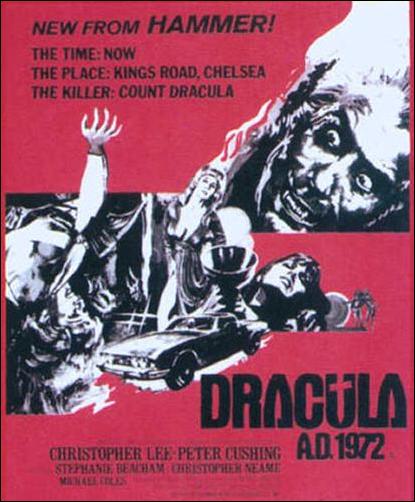
Fitting that the Draculine AD 1985 London version of Gleamprog (Land: postmodern power is vampiric, it's dead but it carries on) should have fed upon the rusting relics of the docks... heronbone: 'i'm worried that there's plans to do away with the sewer banks in this whole troubling stratford city concept. the sewrbanks/greenway is a real sanctuary, a refuge and i love it to bits. i'd hate to see it go. i was reading in the paper a while back about how a lot of the plants you see growing round there are naturalised foreigners, from places as far afield as siberia and sumatra which established themselves when london still had working docks. (which is the most romantic thing i can imagine, ships coming in the dock from all 4 corners of the earth, imainging the men stepping off those boats like odessyeus returned from troy, superheroes with an air of magic about them, eyes which had seen wonders, things perhaps only gods had seen before)'
Blissblog: "There are flows, but there are silt deposits; a sedimentation builds up and takes on a character. The whole history of London and especially East London (hardcore/jungle/UKG’s heartland) is bound up with being a port--the East End and the docks, the East End and successive waves of immigration -- Jews, West Indians, East Indians, etc. UKG has this odd combination of insularity and a total open-ness to new influences; I’m sure this must be connected to East London’s blend of parochialism and hybridity, its ability to assimilate yet retain a fierce local identity. UKG isn’t just the sum of all the influences that flow through it. '
That's why Wiley's 'Ground Zero' - the 00's equivalent of Foxx's 1980 London Alphaville elektrokosmetropolis, Metamatic, the blackcockney neurobotic 'claustrophobic-paranoiac' answer to the theatrobotic Euro-expansiveness of Kraftwerk's 'Metropolis' and 'Neon Lights' - always evokes for me not the twisted wreckage of the Twin Towers but the superheated Gleamprog heart of darkness of post-1980s UK-Kapital in the Wharf, where the Futures market endlessly sucks the unlife from Now... 00's Kurtz-Kapital-terminal opening up to an Outside not brought back in great big clipper ships but through the loa-stalked consensus hallucination of k-space...

(image stolen from Untimely)
And of course, as Luke is well aware, the Gleamprog fantasy of the London Olympic bid is part of the SF Kapital retro-colonization of London's temporal lines of flight, the uncared for, un-mission-statemented, overgrown, uttunuloid intensive time zones where things can still happen without being business-planned into Kapital's always-deferred super-consummate bad eschatology....
Prog rock never died, it turned into the Millennium Dome... and then London 2012

Follow the link, look at Evil Nice Toneee's face..... listen to his platitudes ('Good Writing' Luke lol')
SF Capital, 2001: 'The smooth transition from hippy to hyper-capitalist, from slacker hedonism to authoritarianism, from engagement to entertainment, retrospectively reveals what the punks knew so well when they cackled 'never trust a hippy'. Far from posing any threat to capitalism, the dope-smoking, soap-dodging rockers of the the 60s were acting as capital's reserve army of exploiters, whose time spent at festivals and on the experimental avant-garde did little or nothing to engineer collective lines of escape, but yielded instead resources for the new forms of enslavement that loom everywhere around us now. Exactly like those likely to have 'approved' of Kubrick's critique of corporate-controlled environments in 1968 are now administering their own 'total control' systems, all the more sinister for their shirtsleeves informality, all the more enveloping because the bosses wire themselves into the circuit, flaunting their own self-exploitation as both inevitable and exemplary. As Deleuz-Guattari had it in Anti-Oedipus, 'The bourgeois sets the example, he absorbs surplus value for ends that ... have nothing to do with his own enjoyment: more utterly enslaved than the lowest of slaves, he is the first servant of the ravenous machine, the beast of the reproduction of capital... 'I too am a slave' - these are the new words spoken by the master.'

For a chilling image of how SF Capital induces auto-zombification in the master class, you only have to look at the face of our glorious leader: that ashen carnival mask, its grim, cheerless, Joker-grin flashing with ritual efficiency, its blank eyes illuminated by empty evangelism, darkened by perpetual irritation - the PM's being run by Videodrome, and ... no-one owns Death TV.'
They are trying to turn London into a Roger Dean gatefold sleeve.
Don't let it happen.
Oppose the bid.
Death to Videodrome...
Long unlive the Now Flesh...

